Huzooraa inaugurates mosques, inspects new Jalsa site in Stuttgart and addresses volunteers
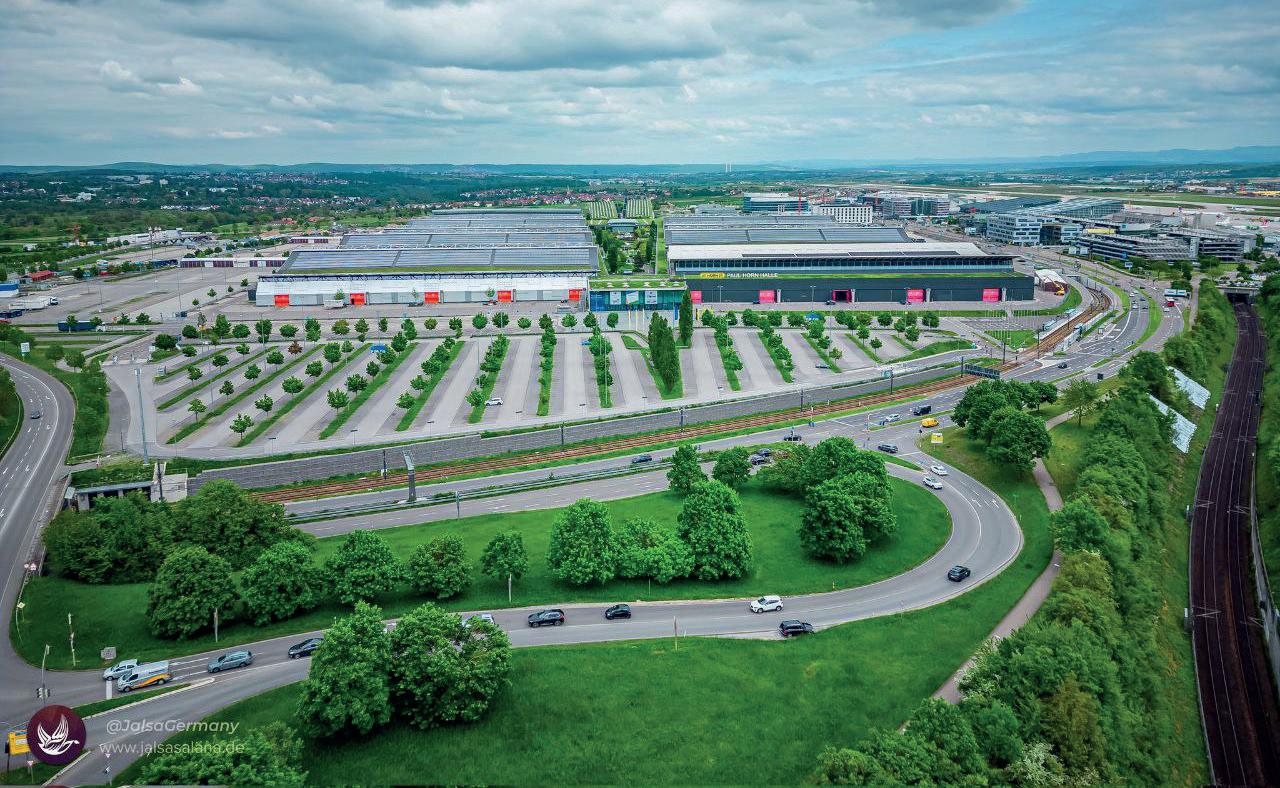
It is narrated by Hazrat Abu Hurairahra, “The Prophetsa said, ‘Among the Children of Israel who lived before you, there were men who used to be inspired [with revelation] though they were not prophets, and if there are any of such persons amongst my followers, it is ‘Umar.’” (Sahih alBukhari, Kitab fada’il ashabi n-nabiyysa, Bab manaqibi ‘umara bni l-khattabi abi hafsini l-qurashiyyi l-‘adawiyyi, Hadith 3689)
Hazrat Mirza Ghulam Ahmadas, In His Own Words
Never slacken in du‘a
feelings
“For the reformation of one’s soul, and for the procurement of the ability to carry out virtuous deeds leading to a righteous conclusion, the second dimension is that of prayer (du‘a). The quality of the outcomes and spiritual fruits one harvests is directly proportional to the extent of one’s reliance and trust in Allah the Exalted, as well as the unyielding steps one takes on this path. All impediments shall be removed, and the
Ahmadiyya Archive & Research Centre (ARC), 22 Deer Park Road, London, SW19 3TL, UK info@alhakam.org | ISSN 2754-7396 THE WEEKLY www.alhakam.org A AL HAKAM | Friday 1 September 2023 | Issue CCLXXXV Removing confusions about the Promised Messiah’s age Page 6 Islam Ahmadiyyat echoes in early 1900s German newspapers Page 14 Page 8 Zikr-e-Habib: Edification of children with kindness and compassion Page 10 Names of Allah 105-114 Continued on next page >>
marking Germany Jamaat’s centenary Hadith-e-Rasul – Sayings of the Holy Prophet Muhammadsa ﻰﻠﺻ ��ﻨﻟا لﺎﻗ لﺎﻗ ،ةﺮﻳﺮﻫ ��أ ﻦﻋ نﺎ� ﻦﻤﻴﻓ نﺎ� ﺪﻘﻟ :ﻢﻠﺳو ﻪﻴﻠ� ���ا لﺎﺟر ﻞﻴﰱا��إ ��ﺑ ﻦﻣ ﻢ�ﻠﺒﻗ ،ءﺎﻴﺒﻧأ اﻮﻧ��ﻳ نأ ��ﻏ ﻦﻣ نﻮﻤﻠ�ﻳ ��ﻌﻓ ﺪﺣأ ��ﻨ� ��ﻣأ ﻦﻣ ﻦﻜﻳ نﺈﻓ Revelation
Hazrat Khalifatul Masih V blesses Jalsa Salana
Continued on next page >>
Last Sunday, multitudes of people flocked to Islamabad, Tilford, on what seemed to be the morning of a typical Bank Holiday
Sunday. What was it that pulled entire families out of bed so early? The chance to see off their beloved Khalifa, as he departed for Jalsa Salana Germany 2023.
The scene was set, and the mixed
– knowing that Huzooraa was leaving but
<< Continued from previous page
supplicant shall ascend to an elevated state of piety [taqwa]. It is an unequivocal truth that until God Almighty wills the purification of an individual, no one can attain it. The death of carnal desires comes only through divine grace and fervour, which are generated by prayer; this strength is acquired solely through prayer.
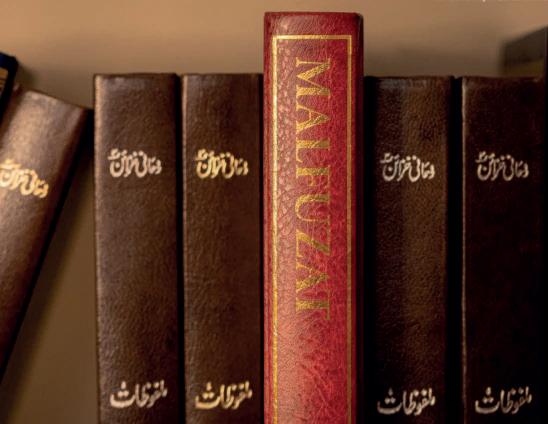
“I must underscore that Muslims, especially those belonging to our Jamaat, must never, under any circumstances, trivialise the importance of prayer. It is in prayer that Muslims should take pride. Followers of other faiths have set before themselves impure inanimate objects to which
<< Continued from previous page
that he would soon be back – pulsated through Islamabad. One intriguing thing about Islamabad is that, whatever the size of the crowd, there is always a sense of serenity and calmness. The same was the case that morning.
Hazrat Mirza Masroor Ahmad, Khalifatul Masih Vaa, arrived in Frankfurt, Germany, just before 10:30 pm where over 3500 members of the Jamaat had gathered in the Bait-us-Subuh complex to welcome Huzooraa. Choral poems were recited, slogans of takbir were called, and all members were jubilant on the arrival of their beloved Imam. Huzooraa made his way to the mosque and led the Maghrib and Isha prayers – a moment everyone had been yearning for. This marked the start of Huzoor’saa visit to Germany.

The atmosphere is charged with a profound sense of spirituality and happiness at the arrival of Hazrat Amirul Momineenaa in Germany after four years.
they direct their prayers, paying them little heed [...] Why would a Christian, who believes that all sins are forgiven through the blood of Christ, find the need to pray? And what could compel a Hindu, who is convinced that repentance is futile and that liberation from the cycle of reincarnation is unattainable, to engage in supplication?
Such individuals are resigned to the belief that their fate is inevitably to reincarnate as dogs, cats, monkeys, or pigs. Therefore, bear in mind that it is the glory and distinction of Islam to incorporate teachings about prayer. Never slacken in this regard and never tire of it.”

(Al Hakam, 17 January 1905; Malfuzat [1984], Vol. 7, pp. 267-268)
German Ahmadis are flocking from all corners of the country, some travelling hundreds of miles, to join in prayers led by Hazooraa, partake in family or individual mulaqats, or simply catch a glimpse of their beloved Imam. The mosque at the Baitus-us-Subuh complex and its adjacent halls are filled to capacity and beyond, resonating with fervour. Individuals and families leave the prayers and mulaqats spiritually rejuvenated.
Inauguration of Mubarak Mosque, Florstadt
On 28 August, Huzooraa inaugurated the new Mubarak Mosque in the German town of Florstadt, which is located approximately 15 miles northeast of Frankfurt am Main. This mosque is part of the 100 mosques scheme that Germany Jamaat is pursuing.
On a previous visit to Germany, Huzooraa laid its foundation stone in a ceremony that took place on 18 October 2015.

In his address at the inauguration ceremony of Mubarak Mosque, Hazrat Mirza Masroor Ahmad, Khalifatul Masih
Vaa, expressed immense gratitude to Allah the Exalted for the occasion. He spoke on the topic of the mosque as a symbol of peace and religious freedom. Huzooraa stated that Islam is often misunderstood in the West due to the actions of extremists. However, he clarified that Islam promotes peace and security, citing the Holy Quran’s teachings that permit warfare only for defence and to establish religious freedom for all.
Addressing the communal spirit, Huzooraa extended special thanks to the mayor of the area; he acknowledged the mayor’s continuous support and cooperation with the Jamaat, highlighting that such collaboration fulfils the duty of friendship for noble objectives.
Turning his attention to the mosque’s location, Huzooraa pointed out its significance. The mosque is situated in a commercial area and serves as a call to God amid worldly transactions. He emphasised the role of the mosque in maintaining a spiritual balance in a commercial environment.
Discussing the current state of the
world, Huzooraa warned that the world is rapidly moving towards destruction due to materialism. He affirmed that mosques teach the importance of caring for the needy and orphans and called for fulfilling the rights of Allah as well as His creation. He cited the teachings of the Holy Prophet Muhammadsa on assisting both the oppressed and the oppressor, stating that stopping the oppressor from oppressing is a form of assistance.
In concluding his address, Hazrat Amirul Momineenaa outlined the objectives for building mosques within the Ahmadiyya Muslim Community. He prayed that the Ahmadis in the area may become more active in spreading the teachings of peace and love after the construction of this mosque and fulfil both the rights of God and His creation. Amin Guests from various sections of society joined the inauguration ceremony. Two mayors and a member of the provincial assembly also spoke at the event. On this occasion, Huzooraa also unveiled a commemorative plaque while leading
Friday 1 September 2023 | AL HAKAM 2
Photo courtesy of Suhaib Ahmad
everyone in a silent prayer. Later, Huzooraa also led the Zuhr and Asr prayers. He inspected the mosque’s architecture and briefly engaged with Jamaat members across all age groups. The mayor had the honour of discussing matters with Huzooraa and joining him in planting a memorial tree, while amila members and other Jamaat volunteers were privileged to have photos taken with him.
Inauguration of Sadiq Mosque, Karben
On 29 August, Huzooraa inaugurated the Sadiq Mosque in Karben, a town that is located approximately 10 miles north of Frankfurt. The foundation stone was laid by Huzooraa on 7 June 2014. Upon arrival for the inauguration ceremony today, Huzooraa also unveiled a plaque, and led everyone in Zuhr and Asr prayers. Later on, he also planted a tree.
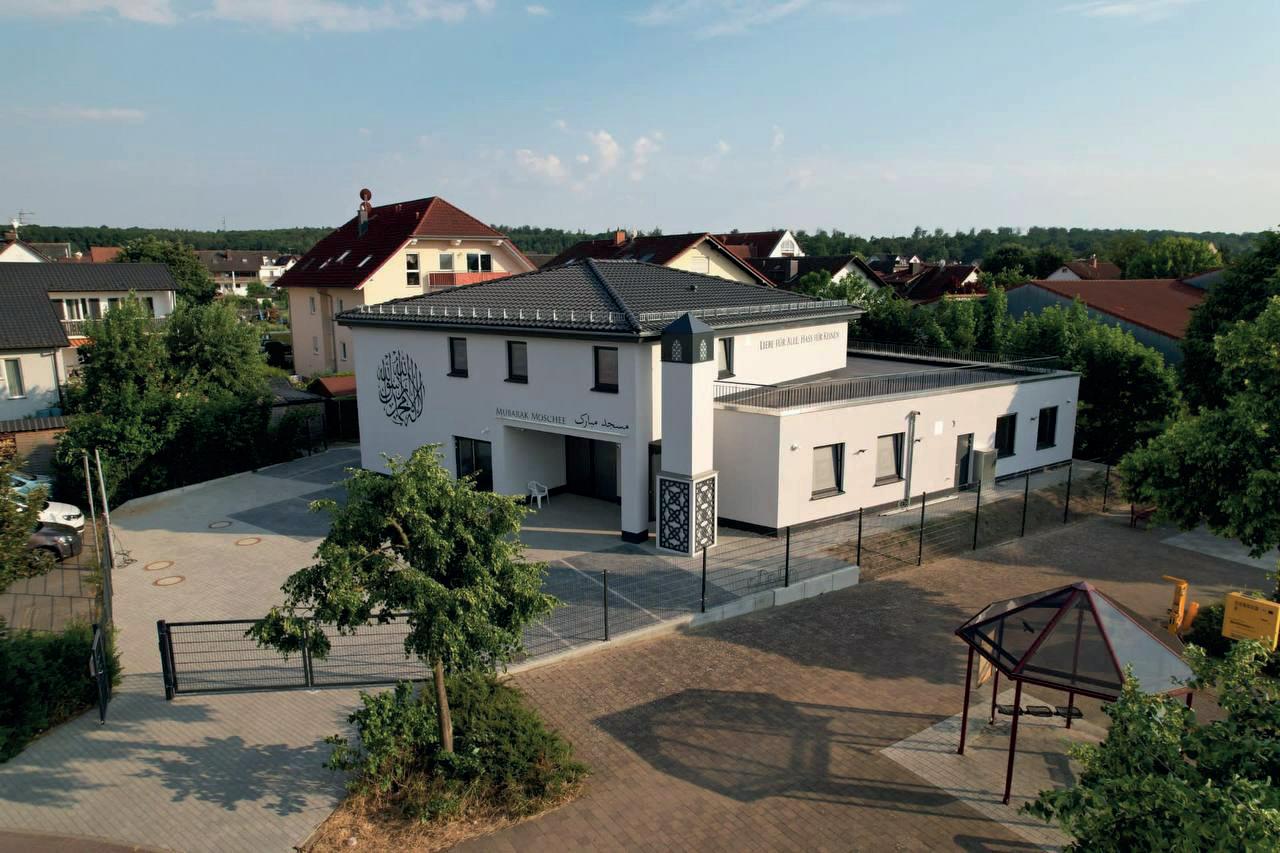
During his address at the inauguration ceremony, Huzooraa said he extends his gratitude not only to Allah, but also to the local people and the municipal administration, for it is our religious obligation to express such thanks in accordance with the teachings of the Holy Prophet Muhammadsa. Huzooraa said, Abdullah Wagishauser Sahib, the Amir of Germany, noted in his comments that the mosque is situated in the city centre. This is advantageous, as alongside the material amenities provided in the city centre, there ought to be sanctuaries for worshippers to offer prayers to the one God—be it churches or other places of devotion. Huzooraa said that God sent prophets to amicably exhort people to fulfil the obligations owed to both God and humankind.
On the purpose of establishing the
mosque, Huzooraa said that having established this mosque, we shall strive to disseminate the teachings to the public, emulating the paradigm set by the Holy Prophetsa, who affirmed that Islam embodies a doctrine of peace.
While mentioning local opposition to the mosque, Huzooraa said, initially, there was a degree of resistance to the mosque, which might have been partially justified given the negative representation of Islam by some Muslims globally. Nonetheless, some of those sceptics subsequently became allies upon witnessing the true Islamic conduct of local Ahmadis.
On freedom of religion, Huzooraa said, we owe a debt of gratitude to the government for upholding the freedom of religion. He said this liberty has enabled numerous Ahmadi Muslims to settle here and practise their faith without impediment. We are, therefore, thankful to the government for providing sanctuary to those who are persecuted for their beliefs worldwide.
With regard to fulfilling the rights of others, Huzooraa said that the execution of rights is incumbent upon Muslims, and that does not merely instruct us to advocate for our own rights; it also underscores the importance of attending to the rights of others as well. Huzooraa said, that the Ahmadiyya Muslim Community, particularly in regions like Africa and South America, serves individuals through various humanitarian projects, irrespective of their religious affiliation. In fact, 80 per cent of the beneficiaries have no formal connection with the Ahmadiyya Community. Therefore, the Jamaat not only advocates for religious freedom but also manifests this principle through tangible acts of service to humanity.
While emphasising women’s rights in Islam, Hzuooraa said Islam advocates fulfilling the rights of women in the most exemplary manner. Women are accorded all their due rights in Islam, and within our Community, numerous educated women actively contribute to the betterment of society through their professional expertise.
Highlighting the sanctity of places of worship in Islam, Huzooraa said, Islam enjoins the protection of all religious sanctuaries. Consequently, those who engage in the desecration of churches are acting in contravention of Islamic principles.
On the topic of communal harmony, Huzooraa said that, as the mayor aptly noted, this gathering appears not solely to be an assembly of the Ahmadiyya Muslim Community, but a congregation of diverse individuals from this locality. Huzooraa added that this is precisely our objective—to foster unity among people. Huzoor further highlighted the rights of neighbours given by Islam.
In the end, Huzooraa prayed that the mosque may serve as a platform for imparting the authentic teachings of Islam to the people. He also prayed that God may enable all humanity to dwell in harmony, recognise their Creator, and duly fulfil the obligations of His worship.
Hazrat Khalifatul Masih V inspects Jalsa Salana Germany site and addresses volunteers
Stuttgart, Germany, 31 August 2023: At approximately 8 pm local time, Hazrat Mirza Masroor Ahmad, Khalifatul Masih Vaa, arrived at Messe Stuttgart, the venue of Jalsa Salana Germany 2023. Huzooraa
inspected the Jalsa site and departments, while also giving guidance to the volunteers. During Huzoor’saa inspection, he also spoke with members of Jamaat-eAhmadiyya UK who cycled to Germany for the Jalsa, visited the tabligh exhibition hall where he saw the Holy Quran and Chinese exhibitions, spoke to African delegations, inspected the Langar Khana after which he visited the Lajna Jalsa Gah
Huzooraa then headed to the main Jalsa Gah, where he addressed the Jalsa Salana volunteers and gave them guidance. Prior to Huzoor’saa address, a recitation of the Holy Quran, Surah al-Baqarah verses 149150 was presented, along with the Urdu and German translations.
Huzooraa said that it is Allah’s grace that, after a long period, Jamaat-e-Ahmadiyya Germany is getting the opportunity to hold a large-scale Jalsa Salana. Huzooraa said that, insha-Allah, Jamaat-e-Ahmadiyya Germany will in the future be able to acquire its own place. Speaking about the site, Huzooraa said that this year’s Jalsa site is very large and thus requires more effort on behalf of the volunteers, especially in terms of the security arrangements as antiMuslim and anti-Ahmadi sentiments exist.
Addressing the guests, Huzooraa said food would be served to everyone, but patience was needed. Those serving the food must do so in a cheerful manner, and like he said to the UK Jalsa Salana volunteers, everyone should wear their smiles.
Huzooraa said that on the Lajna side, the security teams should also have a positive and happy temperament while remaining diligent and carrying out security checks.
Continued on page 5 >>
3 AL HAKAM | Friday 1 September 2023
Mubarak Mosque, Germany
This Week in History
A glimpse into the rich history of the Ahmadiyya Muslim Jamaat
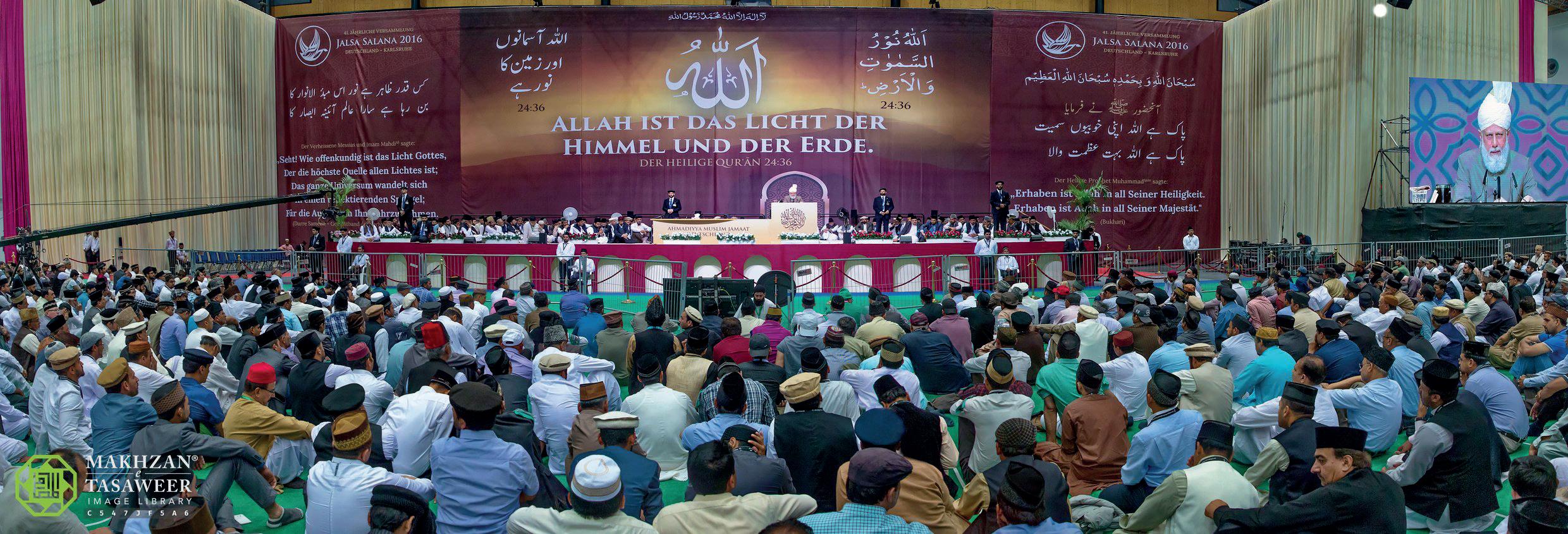
1 September
1 September 1927: On this day, a meeting took place between Hazrat Musleh-eMaudra and the then Viceroy of India, Lord Irwin, at the Viceregal Lodge in Shimla. The ongoing political and religious situation in the country was discussed, and Huzoorra advised the Viceroy to make full efforts to make peace between Muslims and Hindus.
On the same day, Huzoorra published a 20-point memorandum that outlined his proposals for the establishment of peace and harmony between Hindus and Muslims. The memorandum was sent to the leaders of both communities.
For more details, see “Communal harmony, Unity Conference, and Muslim rights: Hazrat Musleh-e-Maud’s 1927 visit to Shimla” (Al Hakam, 24 February 2023, Issue 258, pp. 13-16).
1 September 1968: On this day, Hazrat Khalifatul Masih IIIrh addressed members of the Jamaat in Karachi in which he said that in this age, the most important task was to make every effort for the spread of Islam. (Tarikh-e-Ahmadiyyat, Vol. 24, p. 580)
2 - 3 September
2 September 1904: On this day, the Promised Messiahas was in Lahore. After the Jumuah prayer, the Promised Messiahas delivered a lecture. (Tarikh-e-Ahmadiyyat, Vol. 2, p. 351)
3 September 1904: The Promised Messiahas was in Lahore. At 7:30 am on this day, a lecture of the Promised Messiahas was read out entitled, “Modern religions in this country and Islam”. It was read out by Hazrat Maulvi Abdul Karim Sialkotira in the presence of the Promised Messiahas. After it was read out, the Promised Messiahas briefly addressed the audience. (Tarikh-eAhmadiyyat, Vol. 2, p. 351)

3 September 1947: On this day, Liwa-e-Ahmadiyyat, the flag of Ahmadiyyat was transported to Lahore from Qadian after the partition of British India. Mirza Abdul Ghani Sahib discharged this blessed and historic duty. (Tarikh-eAhmadiyyat, Vol. 10, p. 39)
3 September 1954: In August 1954, East Pakistan [now Bangladesh] faced a severe flood. During his Friday Sermon on this day, Hazrat Musleh-eMaudra instructed Ahmadis to help their fellow countrymen and women and encouraged
them to raise funds as well. (“Hazrat Mirza Bashiruddin Mahmud Ahmad’s services to the Muslim cause: Nurturing the newly formed Pakistan”, Al Hakam, 12 March 2021, Issue 156, pp. 19-20)
3 September 1988: Hazrat Khalifatul Masih IVrh arrived in Uganda. On this day, Huzoorrh addressed the students and teachers of the Ahmadiyya Bashir High School in Kampala. (Silsila Ahmadiyya, Part 4, p. 849)
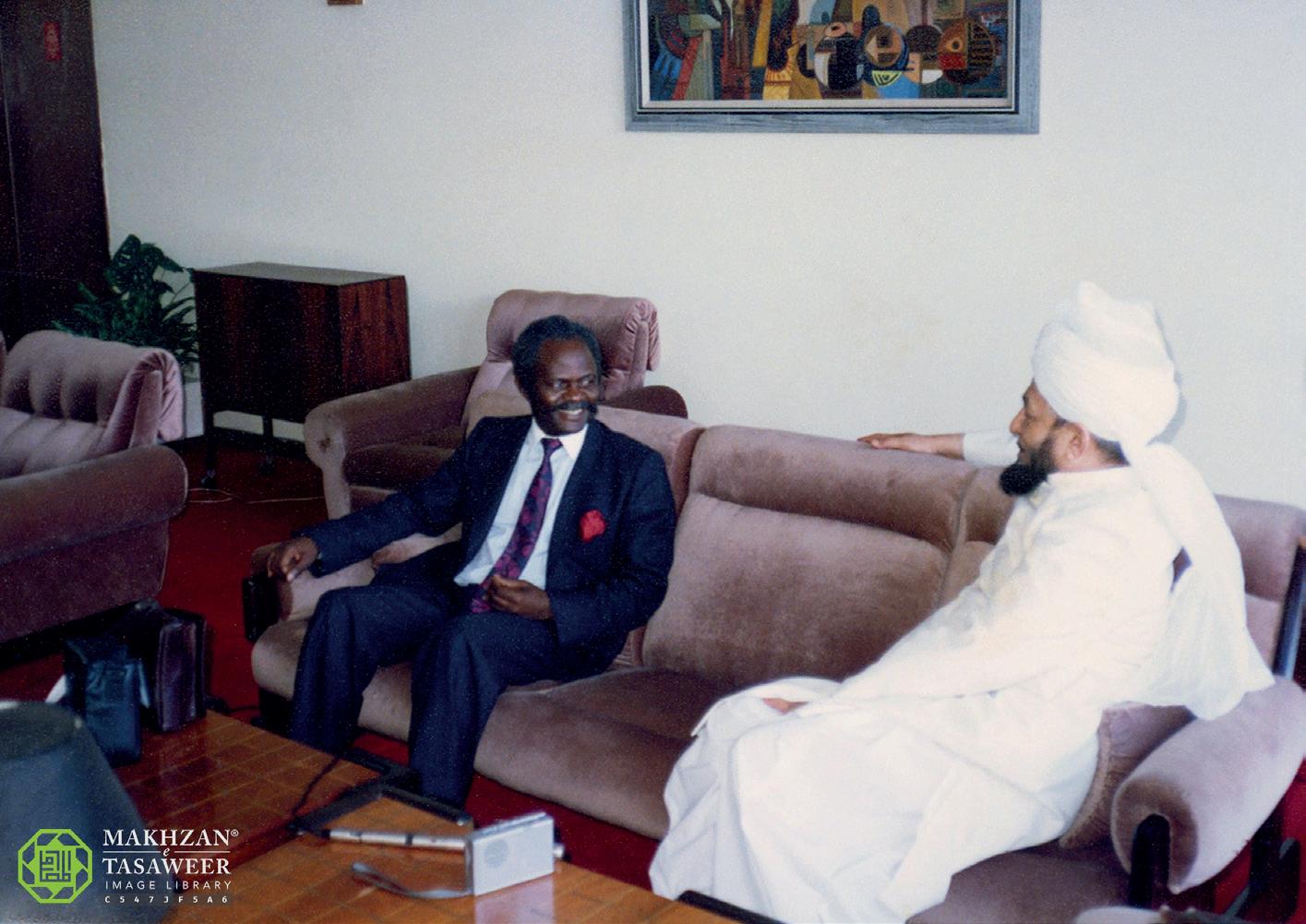
3 September 2016: On this day, addressing the external guests at Jalsa Salana Germany 2016, Hazrat Khalifatul Masih
Vaa said:
“It is an undeniable fact that the world’s peace is teetering on a knife-edge. With each day that passes, we witness increasing conflict and uncertainty across the globe. It is a strange and tragic paradox that even though we are more connected than ever before, we are actually growing ever more distant by the day.” (“Europe at greatest risk of war in 30 years, with possible nuclear consequences”, Al Hakam, 21 January 2022, Issue 201, pp. 23-24)
Friday 1 September 2023 | AL HAKAM 4
Minister of Education of Uganda welcomed Hazrat Khalifatul Masih IVrh at Entebbe Airport, Uganda, 1988
Hazrat Khalifatul Masih V addressing Jalsa Salana Germany, 2016
1 - 7 September
<< Continued from page 3

Speaking about the setup, Huzooraa said that this year’s Jalsa is a testament that, though a long time had passed since a Jalsa on this scale, the Jamaat was able to do it and the future generations would be learning from them.
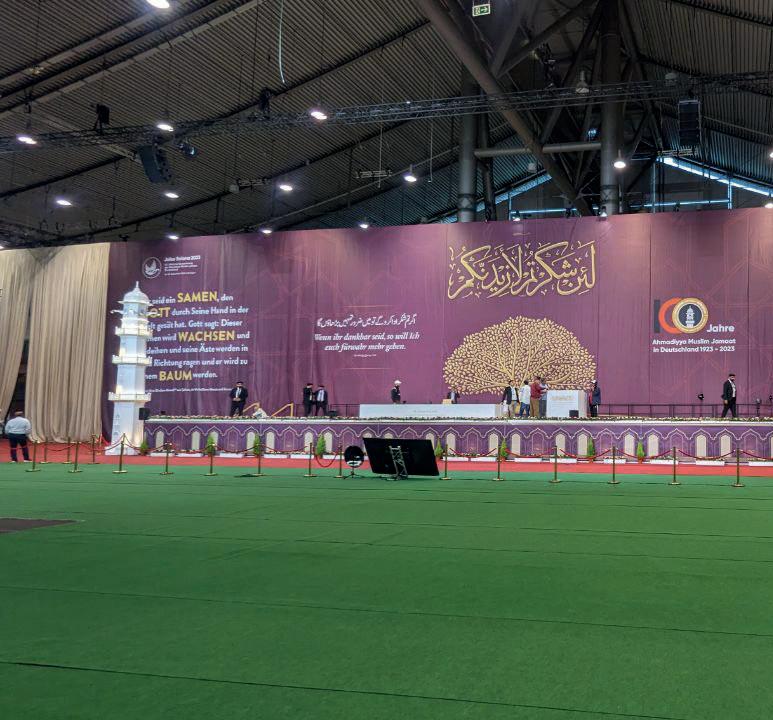
Huzooraa said every volunteer should serve to the best of their abilities and continue smiling.
4 - 5 September
4 September 1965: On this day, an Ahmadiyya mosque in Dayton, Ohio, USA was officially inaugurated. This mosque is the Ahmadiyya Muslim Jamaat’s oldest purpose-built mosque in the USA. Jalsa Salana of the United States was also held in this same mosque in September. (Tarikh-e-Ahmadiyyat, Vol. 23, p. 48)
5 September 2003: On this day, during his Friday Sermon delivered from the Mission House in France, Hazrat Khalifatul Masih Vaa called the attention of the Jamaat to invoking durood sharif [salutations] on the Holy Prophet Muhammadsa.
6 - 7 September
6 September 2016: On this day, Hazrat Khalifatul Masih Vaa inaugurated the Salam Mosque in Iserlohn, Germany. (“New Ahmadiyya Mosque opened in Iserlohn, Germany, by Head of Ahmadiyya Muslim Community”, www.pressahmadiyya.com)
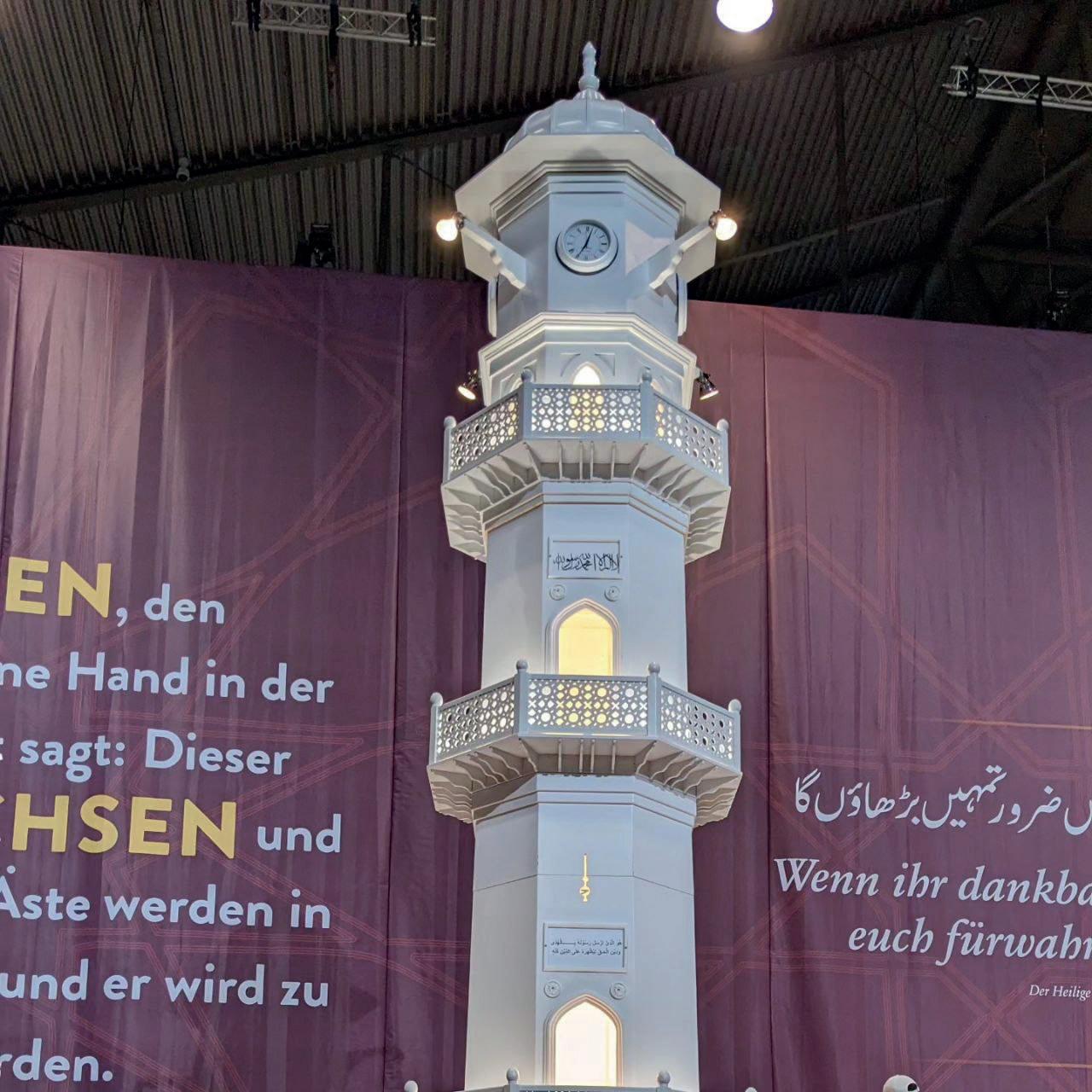
7 September 1927: On this day, during a session of the Unity Conference in Shimla, Hazrat Musleh-e-Maudra narrated his proposals to foster intercommunal harmony, which had already been published as a memorandum on 1 September, and granted in-depth guidance in light of those points. (“Communal harmony, Unity Conference and Muslim rights: Hazrat Musleh-eMaud’s 1927 visit to Shimla”, Al Hakam, 24 February 2023, Issue 258, pp. 13-16)
7 September 1974: The National Assembly of Pakistan, through a constitutional amendment, declared Ahmadis as non-Muslims.
7 September 2016: Hazrat Khalifatul Masih Vaa inaugurated the Subhan Mosque in MörfeldenWalldorf, Germany. (“New Ahmadiyya Mosque opened in Morfelden-Walldorf, Germany, by Head of Ahmadiyya Muslim Community”, www. pressahmadiyya.com)
An interview with Afsar Jalsa Salana Germany

Prior to Huzoor’s arrival at the Jalsa site, we caught up with Respected Ilyas Majoka Sahib, who is serving as Afsar Jalsa Salana Germany 2023.
Regarding the new venue, the challenges
that come with it, and the feelings of Jamaat Germany, Ilyas Sahib told us:
“This venue is much larger than the previous one. We used to have four conference halls, and now there are 10 which is more than double. Last time Huzooraa attended in 2019, there were 40,000 attendees. This year, it is the 100 year centenary and also Huzooraa is attending after four years, so an attendance of approximately 50,000 is expected. This is what we are preparing for.
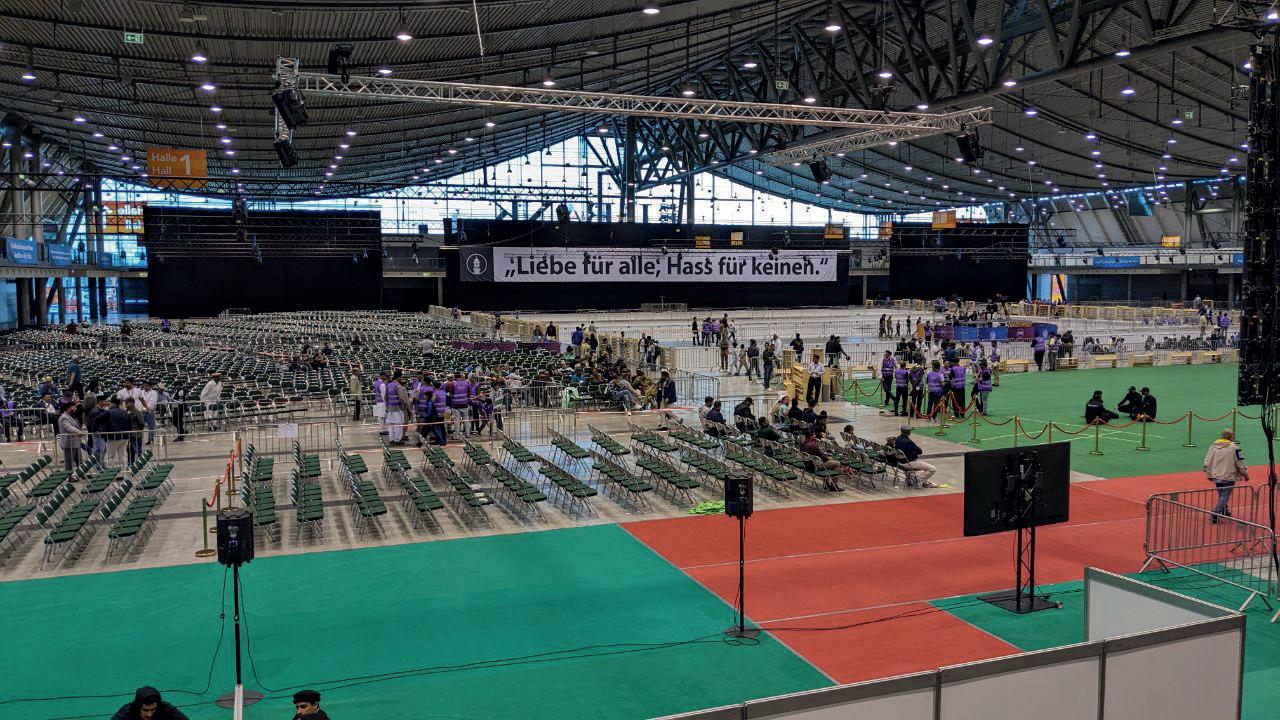

“However, sometimes there are also new challenges with new places. There is the administrative challenge, which means that there is a new local authority to deal with. This is the first time they get to know us. We’re learning how they work and they’re learning about how we work, so this is one of the challenges.
“The second set of challenges is that of logistics and infrastructure. Although it is a large venue, it’s actually a place meant for exhibitions and conferences, and not designed for the annual conventions we hold in the Jamaat. Usually, people who come to exhibitions do not stay overnight, whereas Jalsa Salana is slightly different. There is accommodation, there is food, people stay overnight, etc. There were not sufficient ablution and shower facilities, so we have had to install them as well for the thousands of guests who are going to come.
“There is a lot of excitement. This is something really unique, with the new place and the centenary of the Ahmadiyya Muslim Jamaat Germany. And, above all, the attendance of His Holiness Hazrat Mirza Masroor Ahmadaa. Words cannot describe our happiness.”

5 AL HAKAM | Friday 1 September 2023
Preparations of Jalsa Salana Germany 2023
Removing confusions about the Promised Messiah’s age
Asif M Basit Curator, Ahmadiyya Archive and Research Centre
The reason why the age of Hazrat Ahmadas has remained debatable is primarily due to a revelation that he received regarding his age:
“Eighty years or around that, or a little more…” (Arba‘in III, Ruhani Khazain Vol. 17, pp. 29-30; Zamima Tohfa Golarviya, Ruhani Khazain Vol. 17, p. 66)
The exact time when this revelation was vouchsafed to him is not known, as he has only alluded to it in his later works, stating on both occasions that he had received it around 35 years before.
Both of these works – Arba‘in III and Tohfa Golarviya, were written in the year 1900. Taking out 35 years from the time of the writing of these works takes us back to 1865. Although certain writings indicate that he had been a recipient of divine inspiration from earlier, but in his writings (to follow below), he has marked forty-years-of-age as a starting point.
On another occasion, Hazrat Ahmadas refers to the same prophecy in the following words:
“I am now around seventy years of age. God Almighty informed me in clear words that I shall live to see the age of eighty, add or take five, six years.” (Zamima Barahin-iAhmadiyya, Part 5, Ruhani Khazain, Vol. 21, p. 258)
If one insists on the revelation above being seen in the literal sense, the context cannot be disregarded and will have to be taken literally. This will set his year of birth to 1825, which is not the timeframe that can be established through his original works. To try and establish a timeframe, we will have to take a look at where his original works point to.
Before going into the details, I must state that what follows is based on the extensive research carried out by the likes of Syed Ahmad Ali, (Al Fazl 11 June and 18 June 1933) Maulana AR Dardra (Al Fazl, 3 September 1933), and Hazrat Mirza Bashir Ahmadra. (Al Fazl, 11 August 1936)
This article is an attempt to collate the work of the above scholars, albeit in a different order, not to speak of the little commentary that such an adjustment calls for.
Hazrat Ahmadas understood this revelation to have meant that his age would
be not less than 74, yet not more than 86. (Zamima Barahin-e-Ahmadiyya, Part 5, p. 97, first edition) This is the age expectancy that the recipient of the revelation understood where the span of ten years – 75 to 85 – was bracketed within.
The confusion
What creates confusion and, hence, leads to allegations, are the writings where Hazrat Ahmadas states his birth to have taken place at a time that, at his time of death in 1908, leave him at around the age of 70 or even less.
However, when asked on one occasion about his age, he replied: “Only God has
knowledge of my age.” (Zamima Barahine-Ahmadiyya, Part 5, p. 194) This is not an unusual statement to have been made by someone born in his time, and that too in a tiny village in Punjab. Birth records were rarely maintained, and only approximations could be established through whatever little information was passed down through word of mouth – word that relied on memory and memory that relied on memorable incidents surrounding the birth.
The first and foremost piece of Huzoor’sas writings that are taken as most authentic are based on similar estimation:
“I was born in 1839 or 1840, in the twilight of the Sikh rule, and was in my sixteenth or seventeenth year in 1857…” (Kitab al-Bariyya, Ruhani Khazain, Vol. 13, p. 177)
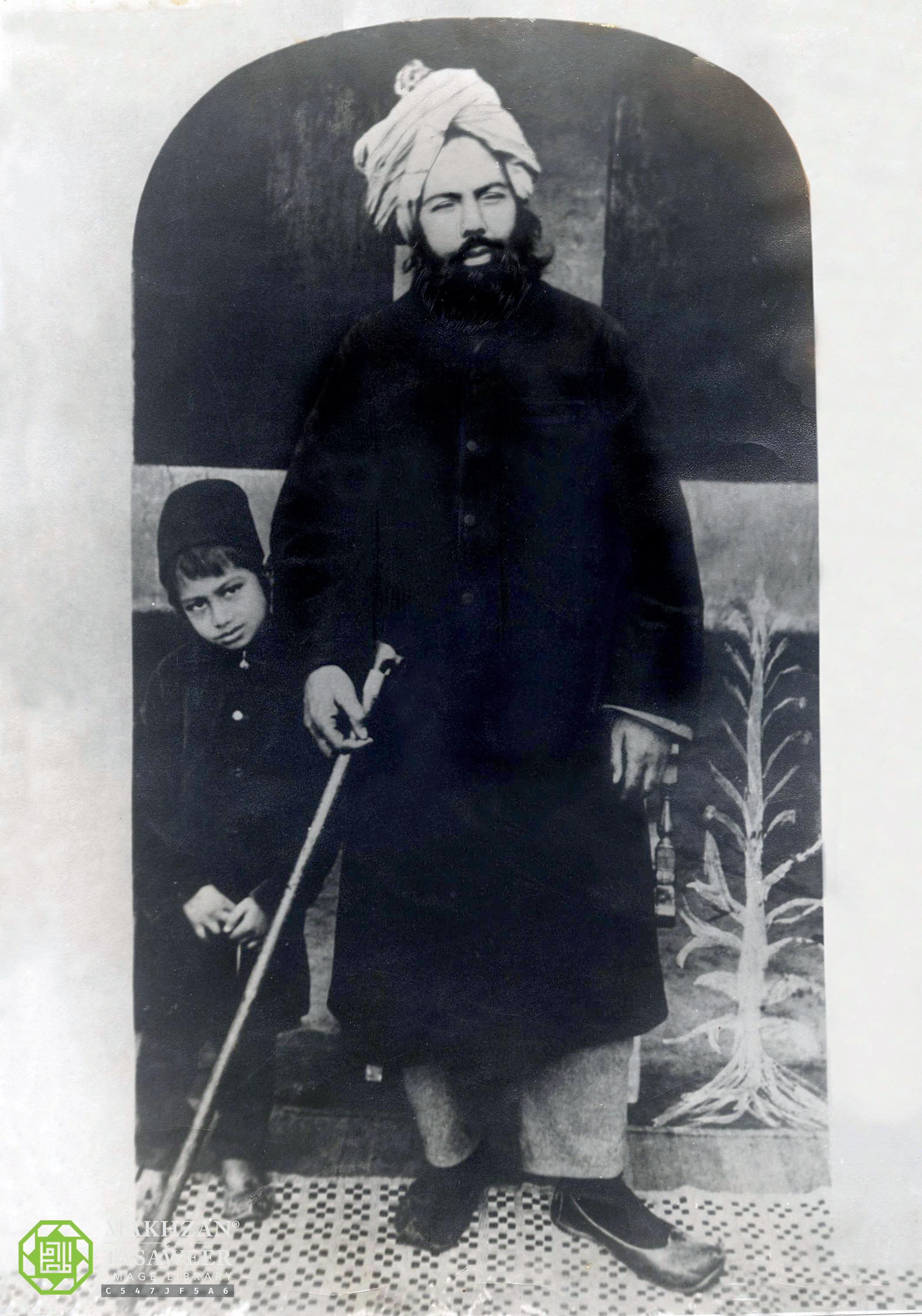
Here, reference is made to two memorable historic incidents: the twilight of Sikh rule and the Indian Mutiny. While reference to the mutiny is the exact year, his age at that time is based on his estimate of his birth year, which, according to this statement, seems to have happened in the “twilight of the Sikh rule”. This twilight had set in towards the latter years of Ranjit Singh and loomed over the Sikh kingdom from his death in 1839 for a whole decade until its collapse.
Although this estimate spans over a decade or even more, Hazrat Ahmad’sas early biographers took this estimate word-forword and put his year of birth down as 1839. (Mian Miraj Din Umar published Barahine-Ahmadiyya with a biographical note on Hazrat Ahmadas; Sheikh Yaqub Ali Irfani held the same opinion in Hayat-e-Ahmad)
What further strengthens that Hazrat Ahmadas here only presented an estimate is where he says that he was “sixteenth or seventeenth year in 1857”. If 1839/1840 are to be taken as accurate, his age by 1857 would have been seventeen or eighteen and not as literally stated. This simple arithmetic shows that the statement was purely based on an estimate and not exact dates.
In the above statement, he goes on to say that his “father had endured huge hardships” (Kitab al-Bariyya, p. 177) before his birth. He goes on to state that “with my birth, my father’s days of hardship had taken a turn towards prosperity, and, hence, it is by Allah’s mercy that I never got to see his days of hardship.” (Ibid)
These hardships that his father had to face was the confiscation of vast estates that spanned over hundreds of acres of land, Qadian inclusive, to the Rangarhia Sikhs –the predecessors of Ranjit Singh. Sir Lepel Griffin, in The Chiefs of Punjab, mentions the partial return of these lands to Hazrat Mirza Ghulam Murtaza, the father of Hazrat Ahmadas:
“…Ranjit Singh, who had taken possession of all the lands of the Ramgharia misl, invited Ghulam Murtaza to return to Kadian and restored to him a large portion of his ancestral estates. He then, with his brothers, entered the army of the Maharaja and performed efficient service on the Kashmir frontier and other places.” (Lepel Griffin, The Punjab Chiefs, Lahore, 1865, pp. 380-381)
Friday 1 September 2023 | AL HAKAM 6
سنینا ہ�لع �تز وأ ،لکذ من �قر وأ لاًحو �ثما
قتو یخرآ کے ںسکھو میں ۱۸۴۰ � ۱۸۳۹ئشاد� یرمیر ۔۔۔‘‘ میں سبر �ھوستر � کا سبر لہسو میں ۱۸۵۷ میں روا ہے ئیہو میں ’’۔۔۔تھا
Hazrat Ahmadas, just a couple of pages before the 1839/1840 statement, writes:
“My father, the late Mirza Ghulam Murtaza, returned to Qadian in the latter part of Ranjit Singh’s rule as he was awarded back five villages from his father’s estate…” (Kitab al-Bariyya, pp. 175-176)
All these statements put together point to the fact that Hazrat Ahmadas was born in the latter part of Ranjit Singh, and not in the year of/after his death.
Confusion resolved
The debate of Jang-i-Muqaddas took place in mid-1893. Since the debate ended with a prophecy by Hazrat Ahmadas that the opponent’s champion, Abdullah Athem, would die within his lifetime, Hazrat Ahmadas mentioned his age several times while referring to the prophecy.
Hazrat Ahmadas refers to this prophecy and the subsequent death of Atham in his book Ijaz-i-Ahmadi (published 1902):
“Show me where Atham has gone? He was sixty-four years old – the same age as me.” (Ijaz-i-Ahmadi, p. 3)
If he was sixty-four at the time of Atham’s death in 1896, then he would be 76 at the time of his death, which takes the year of birth back to 1831 (and 78 according to the lunar calendar).
In another work of Hazrat Ahmadas, Anwar al-Islam (published 1894), he says:
“I can trust in my Truthful and Absolute God that I cannot die without having accomplished my divine task. Although I am sixty years of age now, but I will live on by his grace until I have completed the mission of my faith.” (Anwaar al-Islam, p. 36)
This means he died at the age of 74 (lunar 76) and, accordingly, was born in 1834.
In 1894, while Atham was still alive and Hazrat Ahmad’sas opponents saw this as a failure of his death-prophecy, Hazrat Ahmadas challenged Atham to say on oath that he had not repented. He states in this challenge:
“I too am around sixty years of age; Atham and I are both under the same law of nature. I know that God Almighty will keep me alive at the decisive moment.”
(Majmuah-e-Ishtiharat, Ishtihar Inaami Chaar Hazar Rupay [challenge worth 4,000 rupees], Vol. 2, p. 105, 1894)
This would mean that if he was sixty in 1894, he died at the age of 74 (lunar 76), taking his year of birth to 1834.
When it came to challenges to his opponents, he would usually make reference to his own age. Challenging Alexander Dowie in 1903, he states:
“I am about seventy years of age …” (The Review of Religions, November/December 1903, p. 480)
This makes his year-of-birth 1833, however, the word “about” again highlights estimation because, when asked about his age in c. 1905, he replied:
“Only God has knowledge of my age, but as far as I know, I am around seventy years of age as of now, 1323 Hijri. God knows best.” (Zamima Barahin-e-Ahmadiyya, Part 5, p. 194)
The time of this writing being 1905, this statement places his year of birth somewhere around 1835, meaning he was 73 at the time of his death (lunar 75).
How we know that this book, Barahin-iAhmadiyya V was written in 1905 is proven from a poetic couplet he wrote and included in this book:
“A sign is to appear in a few days’ time; a sign that will shake villages, cities and green lands.” As a footnote to the first line, he adds: “The date today is 15 April 1905. (Barahini-Ahmadiyya, Part 5, Ruhani Khazain, Vol. 21, p. 151)
Staying in the same book and in the poetic works included therein, Hazrat Ahmadas provides another indicator of his age:
“I had been in this passing world for forty years when I was elevated through divine revelation.” (Ibid, p. 135)
This takes us to determine the timeframe of when he started first became a recipient of divine revelation. He states in Kitab alBariyya:
“I spent around forty years of my life under my father’s shelter. As soon as he departed this world, divine revelations started to shower on me with full force.”
(Kitab al-Bariyya, p. 195)
The natural question here is to determine when his father died. He writes in Nuzul alMasih:
“Today, 10 August 1902, it has been twenty-eight years that my father died.”
(Nuzul-ul-Masih, Ruhani Khazain, Vol. 18, p. 495)
In light of this statement, the year of death of Hazrat Ahmad’s father goes back to 1874, meaning Hazrat Ahmadas passed away at the age of seventy-four (lunar 76).
Days, dates and seasons:
The above estimates take us to roughly determine that Hazrat Ahmadas was born in the early 1830s and not at the latter end of the decade. Now, moving from years into days and dates, we see that Hazrat Ahmadas is more clear in stating the day and date of his birth:
“I was born on Friday, the 14th of a lunar month…” (Tohfa-i-Golarviyya, Ruhani Khazain, V 17, p. 281, footnote)
Another statement, recorded by his private secretary and biographer, Mufti Muhammad Sadiq, has it that Hazrat Ahmadas stated that he was born in the Phagan month of the Punjabi calendar. (Mufti M Sadiq, Zikr-e-Habib, p. 189)
Hazrat Mirza Bashir Ahmadra (Al Fazl, 11 August 1936) took upon him the task to put the jigsaw pieces together. The pieces being:
1. 14th day of a lunar month
2. Friday
3. The Punjabi/Hindi month of Phagan
Where all of these came together, in the whole decade of 1830 are two dates:
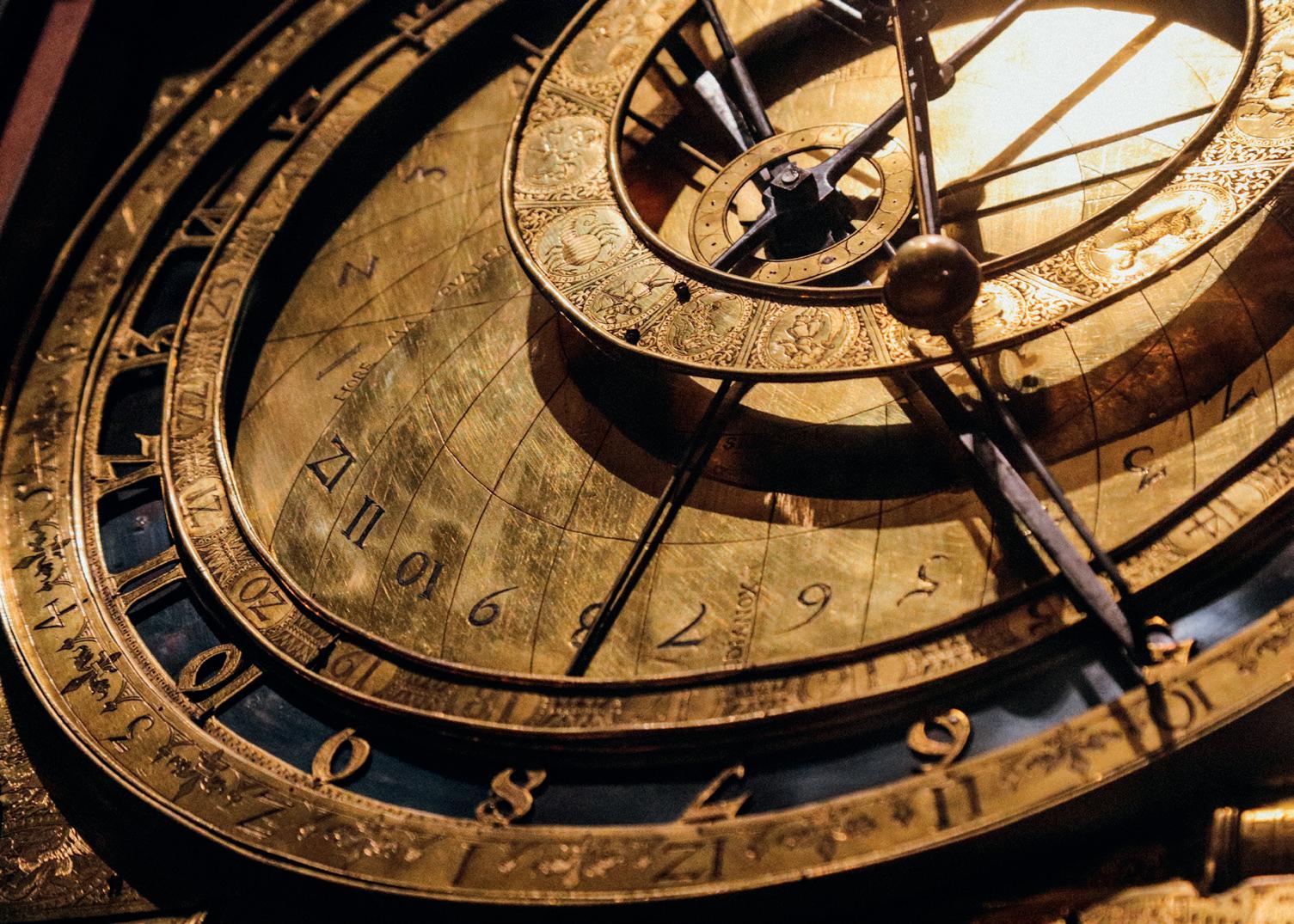
1. 17 February 1832, when it was the 14th day of Lunar/Islamic month of Ramazan and the 1st of Phagan in the Punjabi/Hindi calendar
2. 13 February 1835, when it was the 14th day of Lunar/Islamic month of Shawwal and the 1st of Phagan in the Punjabi/Hindi calendar
While there is the possibility that the former could be Hazrat Ahmad’sas date of birth, what keeps us from setting it there is that had it been Ramadan, he would have mentioned it more prominently than the Punjabi/Hindi month and, also, not merely as “a lunar month”.
Taking the latter to be a relatively more exact estimate of Hazrat Ahmad’s birth, his age at the time of his demise would be seventy-three according to the Gregorian calendar, and seventy-five according to the Lunar.
Since the only exact detail provided by Hazrat Ahmadas himself in this regard is a date and a lunar month, one feels inclined towards rounding off his age at the time of his death according to the Lunar calendar. However, only Allah knows best.
Conclusion
Where absolute certainty is hard to achieve regarding the exact date or year of Hazrat Ahmad’s birth, we can see that the closest we can get to is 13 February 1835. When Hazrat Ahmadas mentioned his age, he was doing so to the best of his knowledge. So, whenever he mentioned his age, even under oath in a court of law, it was according to the best of his knowledge, just as anyone would in that time when no records were kept or maintained.
On a side note, the apparent confusion around the deaths of Jesusas, the first Messiah, and Hazrat Mirza Ghulam Ahmadas, the Promised Messiah, only goes to prove yet another similarity between the two beloved Messiahs of Allah the Almighty.
Foundation stone laid for a mosque in Puttalam, Sri Lanka
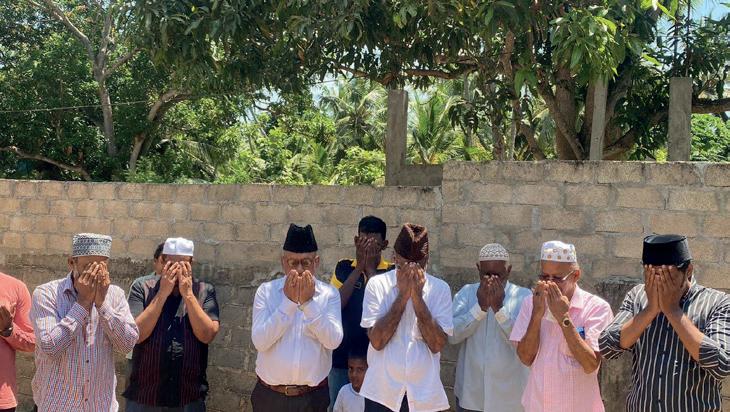
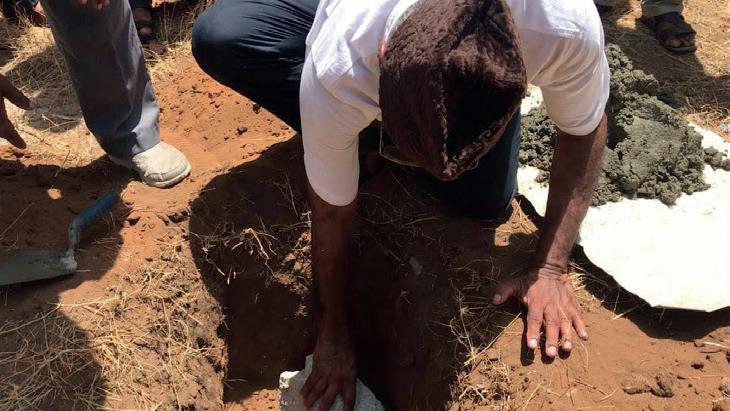
Puttalam is a multi-cultural and multireligious town. Islam is the major religion in Puttalam town, while Buddhism and Christianity are significant minorities with a small Hindu population. It is situated 120 kilometres away from the capital, Colombo. The foundation stone was laid for a mosque here in Puttalam on 6 August 2023, by S Nizam Khan Sahib, National President Jamaat-e-Ahmadiyya Sri Lanka. About 20 members participated in this event. All those who participated also took part in laying the foundation stones of this mosque.
A senior member of the local jamaat was the late Khidr Mohideen Sahib, who embraced Ahmadiyyat in 1960. Prior, he was editor of Unmai Udayam a Tamil newspaper published by the non-Ahmadis known as the Tawheed Group. As an editor, the late Khidr Mohideen Sahib published articles against Ahmadiyyat in that journal. However, later he got answers to all of his accusations against the Jamaat from another pioneer Ahmadi, O Abdul Majeed Sahib of Negombo. As his answers satisfied him, the late Khidr Mohideen Sahib started to study more about Ahmadiyyat through O Abdul Majeed Sahib of Negombo and embraced Ahmadiyyat.
In 1992, a plot of land was purchased, and a prayer hall was built. There are around 30 Ahmadi members living in this town.
7 AL HAKAM | Friday 1 September 2023
بعد کے ند کچھ سے جآ لااو نےآ ہے ںنشا کا راغزمر و شہر و تا�د گے �کھا شدگر سے جس
Alexey Savchenko | Unsplash
A Abdul Aziz Sri Lanka Correspondent
Photos courtesy of AMJ Sri Lanka
Edification of children with kindness and compassion
This series, Zikr-e-Habib, explores the life of Hazrat Mirza Ghulam Ahmadas, the Promised Messiah and Mahdi, and his sayings, shedding light on his noble character and the impact of his teachings on his followers and the world at large.
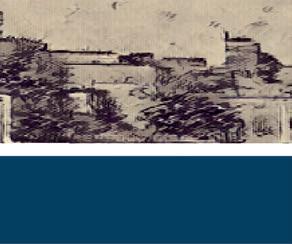
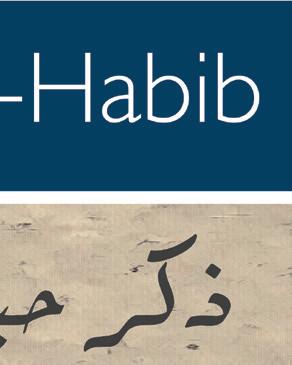

The lives of God’s prophets encompass every important aspect of life and thus serve as paradigms for mankind. One significant part of their lives is related to guiding and edifying the children. With great kindness and care, these messengers of Allah the Almighty take on their parental roles and impart invaluable lessons that transcend generations.
The Founder of Islam, Holy Prophet Muhammadsa said:
“The best among you is the one who is best to his family, and I am the best of those who are good to their families.” (Sunan Ibn Majah, Kitab an-nikah, Bab ‘ishratu n-nisa’, Al-fasl ath-thani, Hadith 3252, 3253)
On another occasion, the Holy Prophet Muhammadsa said:
“Be respectful to your children and instil good manners in them.” (Sunan Ibn Majah, Kitab al-adab, Bab birri l-walidi wa l-ihsani ila l-banat, Hadith 3671)
Hazrat Mirza Ghulam Ahmadas, the Promised Messiah and Mahdi, followed his master like night follows day, as he was the reflection of the Holy Prophetsa The Promised Messiahas would also treat children with compassion and guide them in the kindest manner without hurting their feelings or self-respect.
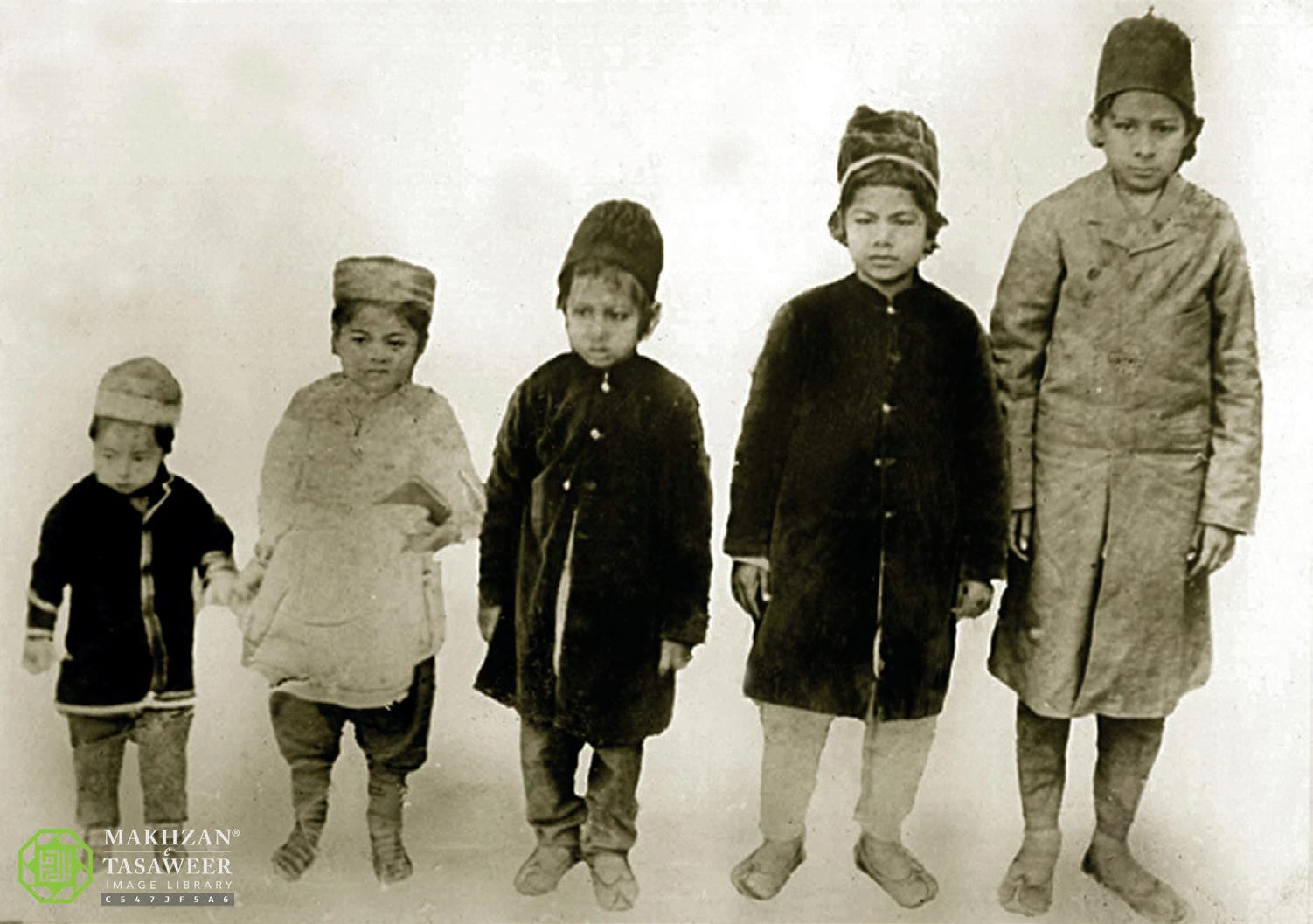
Method of edification

Hazrat Maulvi Abdul Karim Sialkotira says:
“His Holiness, (the Promised Messiahas) is extremely opposed to hitting and scolding children. No matter how much a child may cry or make trouble, complain, make unreasonable requests, or continuously insist on something that is a figment of their imagination or beyond reach, His Holinessas will neither hit them, nor scold them, nor express any signs of anger.
“Mahmud[ra] was perhaps three years of age when the Promised Messiahas was in Ludhiana; I [Hazrat Maulvi Abdul Karimra] was there as well. It was summertime and very hot. A wall divided the men’s and women’s quarters. It was in the middle of the night when I woke up and heard sounds of Mahmud[ra] crying and His Holinessas trying to console him by speaking to him of various things. His Holinessas would pace with the child in his arms, but the child would not be pacified. After all this, the Promised Messiahas said, ‘Look Mahmud, what a beautiful star.’ The child turned to
its new centre of attention, became silent for a moment and then began to cry and bawl, and said, ‘Father! I want to go to the star.’ I immensely enjoyed the endearing manner in which the Promised Messiahas said to himself, ‘Wonderful. I had thought of a way to console him, but he has found a way to cry about this too.’ In the end, the child cried until it tired itself and became silent. However, during this entire time, never once did the Promised Messiahas say a harsh word or express displeasure.” (Life of the Promised Messiahas, pp. 59-60)
Praying for children instead of scolding
In his book on the life of the Promised Messiahas, Iain Adamson writes:
“The prayers of parents for their children and children’s for their parents were always pleasing to God, he [Prophet Ahmadas] said. Children should be guided by good example, and they should not be punished physically, he said. Fathers who beat their children were putting themselves alongside God and so were guilty of a kind of polytheism, believing they shared His attributes of being a true and absolute guide. Those who pushed their children unwillingly in a certain direction, believing they were masters of their children’s destinies, were guilty of the same sin.” (Ahmad[as], The Guided One, pp. 241-242)
Hazrat Maulvi Abdul Karim Sialkotira states:
“His Holiness, [Prophet Ahmadas] is strongly against punishing children. I have witnessed countless times that nothing displeases him more than when he hears about someone hitting a child.
“There was a man here [in Qadian], who
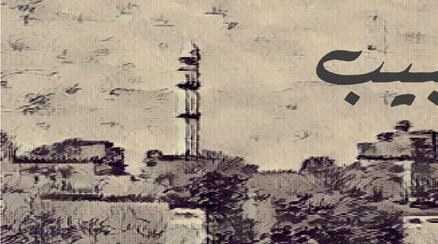
once hit his son, as was his habit. When His Holinessas was informed of this, he was deeply affected. He called for the man and delivered a heart-rending address. The Promised Messiahas said:
“‘In my view, to strike a child in this manner is equivalent to associating partners with God. For the ill-natured perpetrator who hits a child arrogates themselves to a position of granting guidance, a position only held by God, and seeks to partake of God’s station of providence.’ The Promised Messiahas continued:
“‘When an incensed man punishes someone for something, he will continue to grow in anger until he takes on the form of an enemy, and in proportion to the actual offence, he will overstep in punishment by miles. A person who is patient and does not lose the reins of self-control, and who is fully tolerant, forbearing, calm and composed, does have the right to punish or reprimand a child on an appropriate occasion. However, a short-tempered, intolerant and unreasonable person is not suitable at all for the training of children.’ His Holinessas went on and said:
“‘Alas! If only parents would spend as much effort in prayer as they do in seeking to punish their children, and if only they made it a constant practice to supplicate for them with a burning heart. Indeed, the prayers of parents for their children are blessed with special acceptance.’ The Promised Messiahas said:
“‘I have made it compulsory upon myself to make certain prayers on a daily basis. Firstly, I pray for my own soul that God may use me for such work by which His Honour and Glory is manifested, and may He enable me to act in a manner
that fully pleases Him. Then I pray for the members of my household that may Allah the Exalted grant me the delight of my eyes through them and that they may tread the path of His pleasure. Then I pray for my children that they may all become servants of the Faith. Thereafter, I pray for all my sincere friends by name, and then I pray for all those who are a part of this community, whether I know them personally or not.’ During the course of this discussion, the Promised Messiahas said:
“‘It is unlawful for such a person to take the seat of a spiritual guide and leader, who is negligent of his followers for even a moment.’ Also, he said, ‘Guidance and upbringing, in essence, is in the hands of God. Nagging incessantly and persisting on a matter beyond reasonable bounds, i.e., to prohibit and rebuke children on every little thing, demonstrates that we are, as if, the masters of guidance, and will be able to bring our children on the path that accords with our own will. This is a hidden form of associating partners with God. My community ought to refrain from such a practice.’ The Promised Messiahas categorically said, and also gave instructions in writing, that ‘Any teacher in our school who has the habit of hitting children and does not refrain from this inappropriate action should be dismissed immediately.’
The Promised Messiahas also said:
“‘I pray for my children, and see to it that they follow broad principles, etiquette and teachings; that is all, nothing more. Then I place my entire trust in Allah the Exalted. The seed of goodness that is present in each of them, according to their nature, will flourish when the time comes.’
“Brothers! One ought to take a lesson from this practice of His Holinessas. There are some from among our community who make very tall claims and assert themselves as having traversed all the stations of divine understanding, but when they are angered – and that too on trivial matters – they turn into ferocious beasts. They do not treat their children well. They consider it an obligation to hit them and for this they will present countless arguments. I trust they will change themselves after this example.”
(Life of the Promised Messiahas, pp. 60-62)
Patience and trust in God
“On one occasion, when Mian Mahmud[ra] was some four years of age, His Holinessas was sitting inside, writing as usual. Mian Mahmud[ra] came with a matchbox, accompanied by a group of children. Initially, for some time, the children played and argued with one another as children do, but then Mian Mahmud[ra] did as he pleased
Friday 1 September 2023 | AL HAKAM 8
M Adam Ahmad
Al Hakam
��ہ�ل م���ﺧ اﻧأو ﻪﻠہ� م���ﺧ م���ﺧ
مﻬبدأ اوﻨﺴحأو مﻛدالوأ اوﻣ��أ
and set fire to the written manuscripts in the room. This amused him, and he began to clap in joy; all the while, His Holinessas was engrossed in writing and did not even raise his head to see what was being done. Before anything could be done, as the fire subsided, these valuable manuscripts were reduced to a heap of ash. Some other form of amusement then drew in the children, and they went on their way.
“It was later on, when His Holinessas felt the need to consult his previously written pages for context, that the matter became apparent. The Promised Messiahas asked one child, but he was silent. Then he asked another, who also had no words out of fear. Finally, one child spoke and said, ‘Mian Sahib has burnt the papers.’ All those in the home were in fear of what would happen next. In reality, due to the gravity of the situation, they were all apprehensive and expected a terrible outcome and an unpleasant situation – and no doubt, they should have. However, His Holinessas smiled and said, ‘Wonderful. In this, there must be great wisdom of Allah the Exalted. Now, God Almighty desires to disclose upon me an even better exposition.’
“In this instance as well, one who is inclined to critical analysis ought not to pass over this incident without comparing it to the ways of others.” (Ibid., pp. 34-35)
Listening to and engaging with children
Hazrat Maulvi Abdul Karim Sahibra says:
“I have seen countless times that his own children and other children also will be sitting on the charpoy of the Promised Messiahas and inconvenience him to sit at the foot of the charpoy, while in their own childish tongue, they will tell him, for hours, stories of toads, crows and birds; and the Promised Messiahas will go on listening with pleasure, as if someone was reciting the Mathnawi of Maulana Rum.” (Ibid., 5859)
Iain Adamson states:
“Children were equally at ease with [Prophet] Ahmad[as]. They climbed on his lap and told him their nursery tales of frogs, crows and animals. He told them stories, too, it is remembered. They treated him as a companion. One of his wife’s friends often stayed with them for a month. Her little daughter occasionally amused herself by coming into his room and fanning him as he worked. One day, she found it more interesting to sit by the window. She told him, ‘Come and sit over here. It’s easier for me,’ [Prophet] Ahmad[as] duly got up and sat where she had directed.
“When the boys of the school were going off to sit the matriculation examination, they sought his blessing before they left. He was about to return to his house when his coat was suddenly tugged violently from behind. ‘Please, Sir, I’ve been left out,’ said a small boy. Ahmad[as] turned, smiled and shook hands with the boy. ‘May all of you pass,’ he said.
“With his own children, he was always an indulgent but caring parent. […] His sons and daughters remember Ahmad playing with them as small children, riding on his shoulders when he went for a walk, teasing them gently when they were in bed. He did not consider himself above nursing a fractious child.” (Ahmad[as], The Guided One, pp. 241-242)
The Promised Messiahas would listen to his children and even fulfil their childish wishes to create a strong bond with them. Narrating one such incident, Hazrat Abdul Karim Sahibra says:
“Once in the winter season, Mahmud[ra], who was a child at the time, put a large piece of brick in the waistcoat pocket of His Holinessas. When the Promised Messiahas lay down, the brick would push into his side. He turned to Hamid Ali and said, ‘For the last few days I have been experiencing pain in my rib; it feels like a pricking pain.’ He was surprised and began to pass his hands over the body of the Promised Messiahas and eventually his hands were able to identify the piece of brick, which he immediately took out of the pocket of the Promised Messiahas and submitted, ‘It was this brick that was hurting you.’ His Holinessas smiled and said, ‘A few days ago Mahmud put this in my pocket and told me not to take it out because he said he would play with it.’” (Life of the Promised Messiahas, pp. 65-66)
Guiding with kindness and compassion
Hazrat Nawab Mubaraka Begumra states:
“Once the Promised Messiahas was resting on a charpoy in the garden, and I and Mubarak brought a turtle to show him. After some time, he said, ‘Come here, I will relate to you the story of Muharram today.’ We both sat next to him. He started narrating the events of Hazrat Imam Hussain’sra martyrdom.
“The Promised Messiahas said, ‘He [Imam Hussainra] was the grandson of our Prophetsa. Hypocrites and oppressors martyred the hungry and thirsty Imam Hussainra in Karbala. […]
“The Promised Messiahas narrated quite a long story. His state was such that he was overwhelmed with emotions and tears were flowing down [his cheeks]. The Promised Messiahas would wipe the tears with his index finger, and I always remember that sight.” (Mubaraka ki Kahani Mubaraka ki Zubani, p. 25)
Iain Adamson says:
“He [Prophet Ahmadas] guided them [children], too, to have respect for God’s other creatures. When Mahmood[ra], as a little boy, tried to catch sparrows by shutting the door of the mosque, he told him, ‘No one catches the little sparrows of his own abode. One who has no compassion has no faith.’
“And when Mahmood[ra] was older and went out shooting and returned with a parrot, Ahmad[as] told him, ‘It is flesh, so morally it is not forbidden to eat it. But God has not created all birds for eating. Some beautiful birds are there for us to see and enjoy, while other birds are gifted by nature to delight us with their songs.’” (Ahmad[as], The Guided One, pp. 242-243)
Life lessons
Hazrat Sheikh Yaqub Ali Sahib Irfanira states:
“On 15 February 1901, there was a cricket match among the students of Talimul-Islam School, Qadian, and some elders also watched it to encourage the children. […] A child of the Promised Messiahas asked him out of simplicity, ‘Why didn’t you come to watch the match?’ […] The
Promised Messiahas replied:
“‘They [the children] would have eventually come back after playing, but ‘the cricket match’ I am playing will continue till the end of times.’” (Sirat Hazrat Masih-eMaudas by Hazrat Sheikh Yaqub Ali Irfanira, p. 371)
Iain Adamson states:
“He [the Promised Messiahas] took a constant interest in their education. When Mahmood[ra] arrived home one afternoon, he told his younger brother Mian Bashir that their teacher had asked them to discuss which was more valuable – wealth or knowledge.
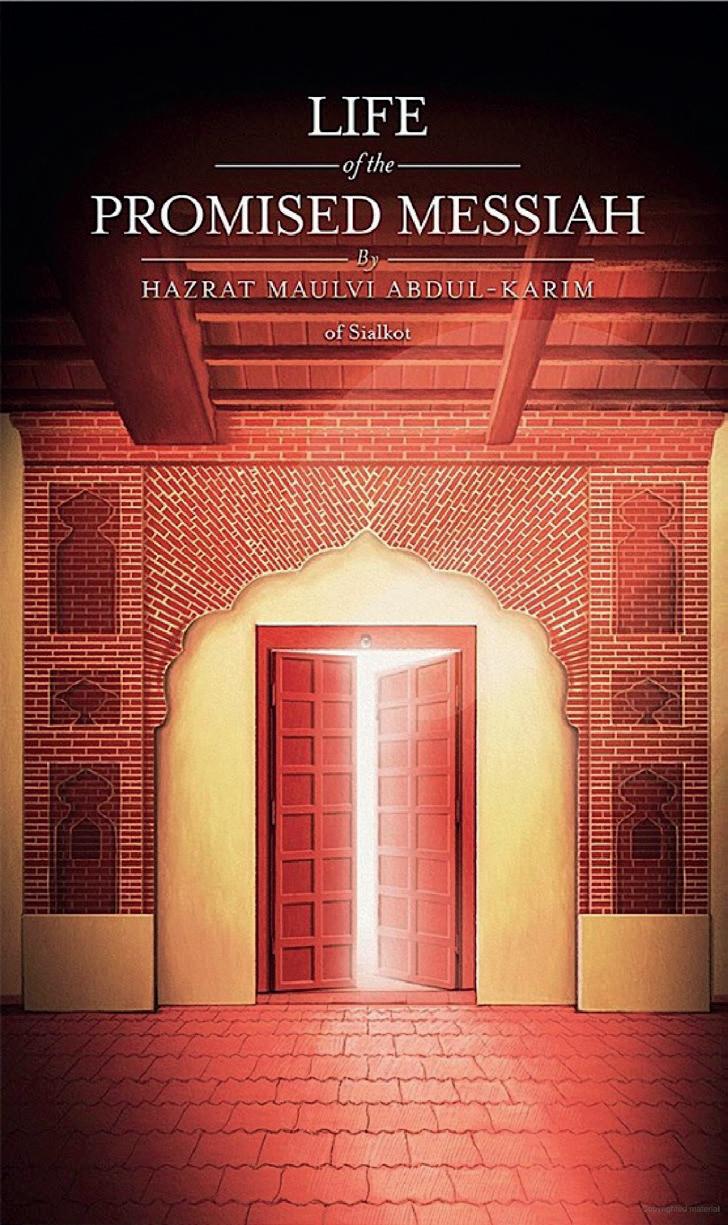
“Which do you think is more valuable, he asked his brother. [Prophet] Ahmad[as] interrupted. ‘Neither,’ he said. ‘It is the bountiful Mercy of God alone which has real value and is worth seeking.’ On another occasion, he said, ‘The wealth of this world, its kingdoms and grandeur, are not to be envied. What one should truly envy is the act of prayer to God.’
“He [the Promised Messiahas] was very certain that he needed prayers of support. He had asked his first wife to pray for him when they were still children. Now He asked Mahmood[ra], when he was nine years old, to pray for him. He also asked other children to pray for him.
“He [Prophet Ahmadas] instilled in his children great respect and love for their mother, recalling the verse in the Quran that says paradise lay under the feet of mothers.” (Ahmad[as], The Guided One, p. 243)
Looking after children
“The firstborn daughter of His Holinessas, whose name was Ismat, fell ill in Ludhiana with cholera. His Holinessas would tend to her and would run to and fro to care for her as if he would never be able to live without her. A materialistic person who in ordinary, worldly terms is infatuated and preoccupied with his children could perhaps not have shown a greater example of toil and labour. However, when she passed away, His Holinessas stepped away as if nothing had happened and did not dwell over what was past. Such resignation and submission to the destiny and decree of God cannot be possible for anyone except those who are sent from Allah.” (Life of the Promised Messiahas, p. 91)
Rights of parents
Where there are rights of children, Allah the Almighty also emphasises kindness and obedience to parents in the Holy Quran. The Promised Messiahas said:
“God desires that you worship no one else and treat your parents with kindness. Truly, what a remarkable sort of providence it is that when a human being is a child and has no power whatsoever, a mother renders invaluable service, and during this time, just observe how a father supports the efforts of the mother. It is merely out of His grace that God Almighty has created two agents to support His weak creation and has made them to reflect the light of His own love. [...]
“Until hearts are inspired by Allah the Exalted, no human being, not even a friend, neither equal nor a ruler, can love anyone; and it is a mystery of God’s boundless providence that a mother and father love their children to such an extent that they will happily bear all sorts of pain to care for them. So much so that parents will not even hesitate in laying down their own lives to save their children. Hence, in order to perfect the higher morals of man, in the words Rabb-in-Nas (the Lord of Mankind), God Almighty has alluded to parents and spiritual guides, so that thankfulness for the system that is apparently observed in the figurative sense may lead a person to show gratitude to the True Lord and Guide.” (Malfuzat [English], Vol. 1, pp. 189-190)
Conclusion
Through his own example, the Promised Messiahas emphasised the importance of edifying and moral upbringing of children. In short, Hazrat Mirza Masroor Ahmad, Khalifatul Masih Vaa said:
Hazrat Maulvi Abdul Karim Sialkotira said:
“His Holiness, [Prophet Ahmadas] cares for and nurtures his children in such a manner that anyone who looks at him with a cursory glance would think that perhaps no one in the world loves their children more. When they are ill, he gives them so much attention, and becomes so absorbed in caring for them and giving them medicine, as if he has no other care in the world. However, a discerning eye can see that all of this is for the sake of Allah Almighty, and in this, His Holinessas has in view the importance to protect and care for God’s weak creation.
“Thus, this is the basic principle that the Promised Messiahas has repeatedly drawn attention to, and it is in fact the explanation of the Quranic teaching that parents’ own example plays an important role in the tarbiyat [moral training and edification] of the children. May Allah the Almighty help us set the best examples for our children. May we fulfil our pledge to give precedence to faith over the world. Some people have the habit of observing others to see how they are, so instead of looking at others, they should focus on improving themselves and becoming righteous. Then, we can expect our generations to do good deeds. Be the ones who consistently pray for their children so that Allah the Almighty always makes our children the delight of our eyes and our legacy continues.” (Friday Sermon, 14 July 2017)
9 AL HAKAM | Friday 1 September 2023
Names of Allah
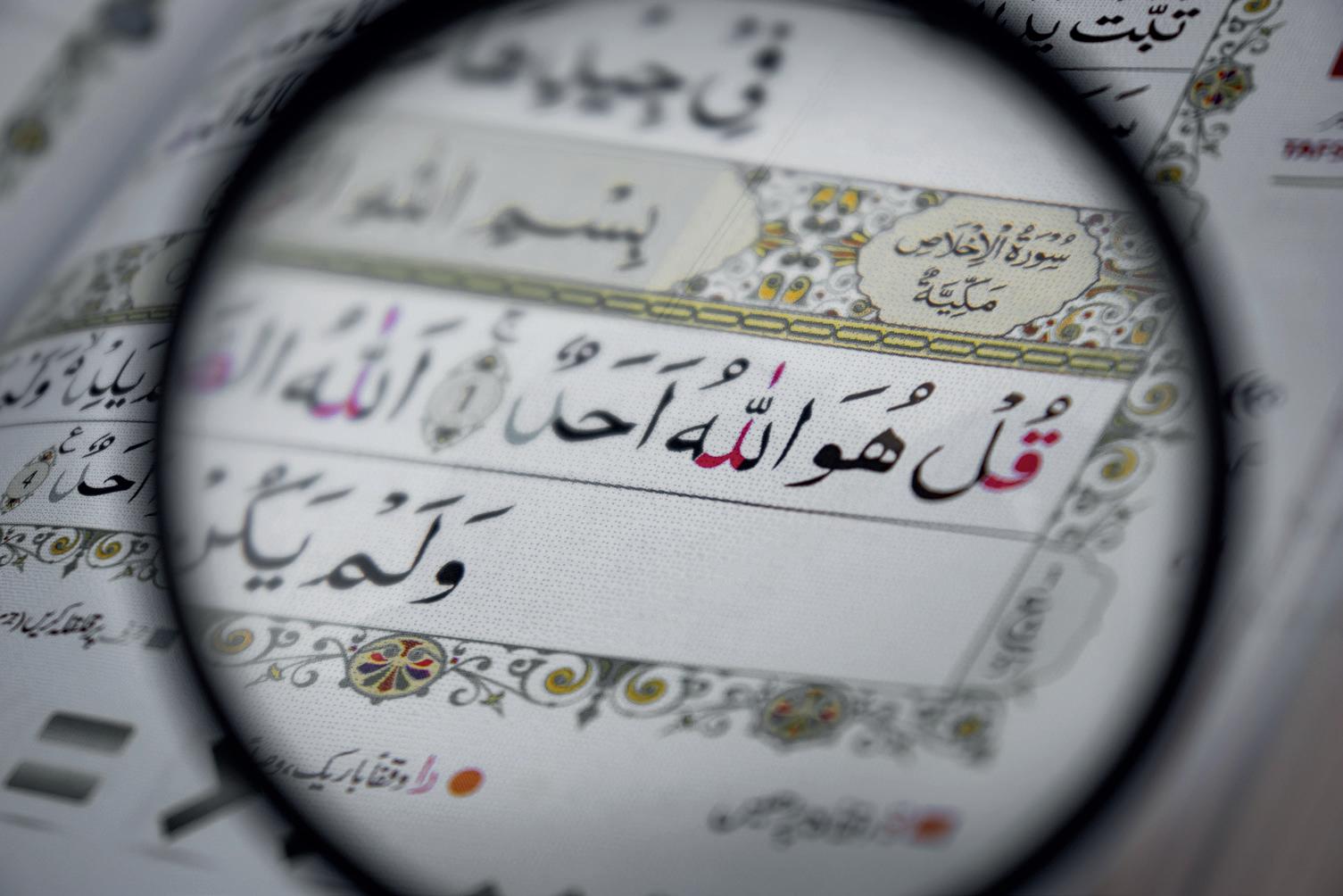
105-114
‘Call on Him by these’
al-Awwal, al-Ākhir, al-Bāqī, al-Wārith, al-Hayy, al-Qayyūm, al-Haqq, al-Wāhid, al-Ahad, Allāh
109. Yā Hayy - O Living! - �� اي
105. Yā Awwal - O First! - لوا اي
106. Yā Ākhir - O Last! - ��آ اي
Meaning
Al-Awwal (the First) means that there was nothing before God. It signifies that He created everything and He is the First Cause of all things. Al-Ākhir (the Last) means that there will be nothing after Him. Whereas everything is subject to death and destruction, He alone will remain after all things have ceased to exist. (The Holy Quran with English Translation and Commentary, 57:4, p. 3093)
Similar names
Al-Awwal (The First) and al-Ākhir (The Last) are opposites.
This name is also mentioned under alBāqī (The Everlasting) and al-Wāhid (The One).
Use in prayer
The Holy Prophetsa said as part of a prayer:
“You are the First (al-Awwal) and there is nothing before You; You are the Last (al-Ākhir) and there is nothing after You.” (Sahih Muslim, Kitab adh-dhikri wa d-du‘a’i wa t-tawbati wa l-istighfar, Bab ma yaqulu ‘inda n-nawmi wa akhdhi l-madja’)
In the same way, everything came from nothing, it will return to nothing. Realising everything we love is temporary causes an existential crisis that makes our hearts turn away from temporary attachments. When we say Yā Awwal (O First!) and Yā Ākhir (O Last!), we pray that our hearts be attached to the only One who is permanent. Remembering how brief our world is gives us perspective on how it is ultimately meaningless without Allah Almighty.
107. Yā Bāqī - O Everlasting! - ��اب اي Meaning
The root of bāqī means to remain or continue, or to exist permanently or endlessly. The name al-Bāqī means The Everlasting Whose existence will have no end. (Lane’s Lexicon, Root: ىﻘ� Entry: قاب ،ىﻘ�)
Similar names
Al-Ākhir (The Last) and al-Bāqī (The Everlasting) are synonymous. (Lisan al‘Arab, Ibn Manzur, Root: ��أ, See “��اﺒلا وہ ���لاﻓ
دع�”) The difference is that the names al-Awwal (The First) and al-Ākhir (The Last) describe the permanence of Allah Almighty within the confines of our understanding of time. The words First and Last are relative to what comes after or

before them. However, the word Everlasting is not relative to anything; it is independent. The name al-Bāqī (The Everlasting) describes permanence that is independent of time. Since time is the creation of Allah Almighty and He transcends it, He is not bound by it. (The Ninety-Nine Beautiful Names of God, al-Ghazali, p. 146-7)
This name is also mentioned under al-Wārith (The Inheritor), al-Hayy (The Living), and al-Haqq (The Truth).
Use in prayer
The opposite of the word baqā (everlasting existence) is the word fanā (non-existence). (Lisan al-‘Arab, Ibn Manzur, Root: ���) Allah Almighty says, “All that is on the earth will perish (fān), And only that will survive (yabqā) which is under the care of your Lord.” (Holy Quran, Surah ar-Rahman 55:27-28) Although everything perishes, those who die after they have given themselves up entirely to God are made to live again because their life is a shadow of the “life” of God. (Chashma-e-Ma‘rifat, Ruhani Khazain, Vol. 23, pp. 165-6) The people who completely submit to Allah Almighty experience a death called fanā (extinction of the self). After this death, they are revived into a new life called baqā (revival and everlasting existence). (Aina-eKamalat-e-Islam, Ruhani Khazain, Vol. 5, pp. 63-72)
The name al-Bāqī (The Everlasting) reminds us that, while only Allah Almighty is truly everlasting, we can be given a type of everlasting life by becoming a shadow of Him. When we say Yā Bāqī (O Everlasting!), we pray that we lose ourselves in Him (fanā) so that we may be revived to a new life that
is everlasting (baqā).
108. Yā Wārith - O Inheritor! -
Meaning
The root of wārith means to inherit, and the word wārith means an heir. Al-Wārith means He who remains after everything has perished, and thus, the property of mankind returns to Him. (Lane’s Lexicon, Root: ثرو Entry: ثراو ،ثرو) Similar names
Al-Bāqī (The Everlasting) and al-Wārith (The Inheritor) are synonymous in their meaning of “remaining after creation ceases to exist.” (Lisan al-‘Arab, Ibn Manzur, Root: ثرو) Al-Wārith has the additional meaning of all ownership of everything returning to Allah Almighty.
Use in prayer
Al-Wārith (The Inheritor) is the One to whom possessions return after their possessors disappear. (The Ninety-Nine Beautiful Names of God, al-Ghazali, p. 148) We only own our possessions for as long as we are alive; after that, we have no control over them. The Pharaohs were buried with their wealth, thinking they could take it with them. However, we all leave this world empty-handed. The name al-Wārith (The Inheritor) reminds us that all this wealth we give importance to will be left behind in this world. After we have all vanished, only Allah Almighty remains as the sole possessor. When we say Yā Wārith (O Inheritor!), we pray that we are able to use our wealth for the sake of Allah Almighty by our own will before that wealth is eventually returned to Him.
110. Yā Qayyūm - O SelfSubsisting and All-Sustaining!مويق اي
Meaning
The root of hayy means life, and al-Hayy means The Ever-Living. The root of qayyūm means to stand up or to establish, and alQayyūm means the Self-Subsisting by Whom all things subsist. (Lane’s Lexicon, Root: ىح Entry: ىح ،ىح; Root: موق Entry: موق; Root: ه�� Entry: ��أ) Similar names
Al-Hayy (The Living) and al-Bāqī (The Everlasting) are synonymous. (Al-Bahr alMuhit, Abu Hayyan, al-Baqarah 2:256, See “
”) The emphasis in al-Hayy is on how, while every other life needs an initial cause for it to begin, it is only Allah Almighty Who is Living as an independent Being in His own right. (Malfuzat, Vol. 1, p. 99; Tafsir-e-Kabir, Vol. 2, pp. 577-8) When contrasted, al-Hayy (The Living) emphasises Allah Almighty being eternally living without the need for any beginning, and al-Bāqī emphasises Allah Almighty being eternally living without end.
Al-Muhyī (The Giver of Life) and alHayy (The Living) come from the same root and are synonymous in their meaning of giving life, (Chashma-e-Masihi, Ruhani Khazain, Vol. 20, p. 362) but al-Hayy has the primary meaning of Allah Almighty being living.
Al-Hayy (The Living) and al-Qayyūm (The Self-Subsisting and All-Sustaining) refer to giving life and then sustaining that life. These two names are interrelated and are thus inseparable. (Tafsir Hazrat Masihe-Maudas, 2:256, Vol. 2, p. 413)
This name is also mentioned under alHaqq (The Truth).
Use in prayer
Al-Hayy (The Living) demands that Allah Almighty be worshipped, and this name is connected to the prayer in Surah al-Fatihah, “You alone do we worship.” Al-Qayyūm (The Self-Subsisting and All-Sustaining) demands that His support should be sought, and this name is connected to the prayer, “You alone do we implore for help.” (Tafsir Hazrat Masih Maudas, 2:256, Vol. 2, pp. 4134) The concept of sustenance in al-Qayyūm (The Self-Subsisting and All-Sustaining) implies that everything would cease to exist if His sustenance was withdrawn. (Chashma-e-Masihi, Ruhani Khazain, Vol. 20, p. 362)
The name al-Hayy (The Living) reminds
Friday 1 September 2023 | AL HAKAM 10
Rizwan Khan Missionary, USA
ﻪﻠ� ﻪﻘﻠﺧ ءاﻨﻓ
اي
ثراو
ﻪيﻠﻋ ءاﻨفﻠِل ﻞيﺒس ال يﺬلا ��اﺒلا ��لا
Muhammad Amaan | Unsplash
us that there is no concept of life without Allah Almighty. The name al-Qayyūm (The Self-Subsisting and All-Sustaining) reminds us that every moment we continue to live, it is only because Allah Almighty continues to sustain us. Whenever a matter would distress the Holy Prophetsa, he would say, اي ثيغتسأ كتمحرب مويق اي ىح “O Living! O SelfSubsisting and All-Sustaining! I seek relief in Your mercy.” (Jami‘ at-Tirmidhi, Kitab adda‘wat ‘an rasulillahsa) We should observe this prayer repeatedly in prostration. (Tafsir Hazrat Masih Maudas, Vol. 1, p. 27)
111. Yā Haqq - O Truth! - قح اي
Meaning
The word haqq means truth and is the opposite of falsehood. It means conformity to the requirements of truth and reality. It also means existence, or existing as an established fact so as to be undeniable. When applied to Allah Almighty, it means everlasting existence, or necessarily existing by His own essence. Al-Haqq means the Truly-Existing, Whose existence and divinity are proven to be true. (Lane’s Lexicon, Root: قح Entry: قح)
Similar names
Al-Haqq (The Truth) is similar to al-Hayy (The Living) in its meaning of existing by His own essence, and it is similar to alBāqī (The Everlasting) in its meaning of everlasting existence.
Al-Haqq (The Truth) is similar to alQayyūm in that it can also mean The SelfSubsisting and All-Sustaining. (Translation of al-Haqq from Tafsir-e-Saghir, pp. 423, 430, 537)
Use
in prayer
The name al-Haqq (The Truth) reminds us that it is only Allah Almighty who is the absolute reality. Everything we perceive with our senses is relative. For example, the colours we see are how our eyes interpret those frequencies of light. The sounds we hear are how our ears interpret those frequencies of sound. Even the matter we observe is subject to laws of nature that are not absolute because they have only existed since the Big Bang. There could have been entirely different laws of nature that governed matter in a different universe.
The name al-Haqq (The Truth) reminds us that it is only Allah Almighty who is the unchanging reality. When we say Yā Haqq (O Truth!), we grasp onto the only permanent and objective reality there is and let go of everything else.
When we stand for prayer, the first question we should ask ourselves is, “Does God exist?” If we have experienced His existence and our heart says, ‘Yes,’ we should continue our prayer. If our heart is unsure, we should pray that He gives us certainty. The name al-Haqq (The Truth) means The Truly Existing; it reminds us that when He shows us His existence through our spiritual senses, we know Him to exist with greater certainty than anything we have ever experienced through our physical senses.
When we say Yā Haqq (O Truth!), we pray that Allah Almighty shows us the truth.
The Holy Prophetsa said as part of a prayer, “You are The Truth (al-Haqq), and Your promise is the truth, and to meet You is true, and Your word is the truth, and Paradise is true and Hell is true, And all the prophets are true and Muhammad is true, and the Day of Resurrection is true.”
(Sahih al-Bukhari, Kitab at-tahajjud, Bab
at-tahajjudi bil-layl) When Allah Almighty shows us something Himself, it becomes an undeniable truth that we know through more refined senses and with greater certainty than anything else.
112. Yā Wāhid - O One! - دحاو اي Meaning
The word wāhid means one, and the first of the numbers. (Lane’s Lexicon, Root: دحو Entry: دحاو) Al-Wāhid means The One or The First.
Similar names
Al-Wāhid (The One) combines the meanings of al-Ahad (The Unique) and alAwwal (The First) because it describes Allah Almighty as The One and The First.
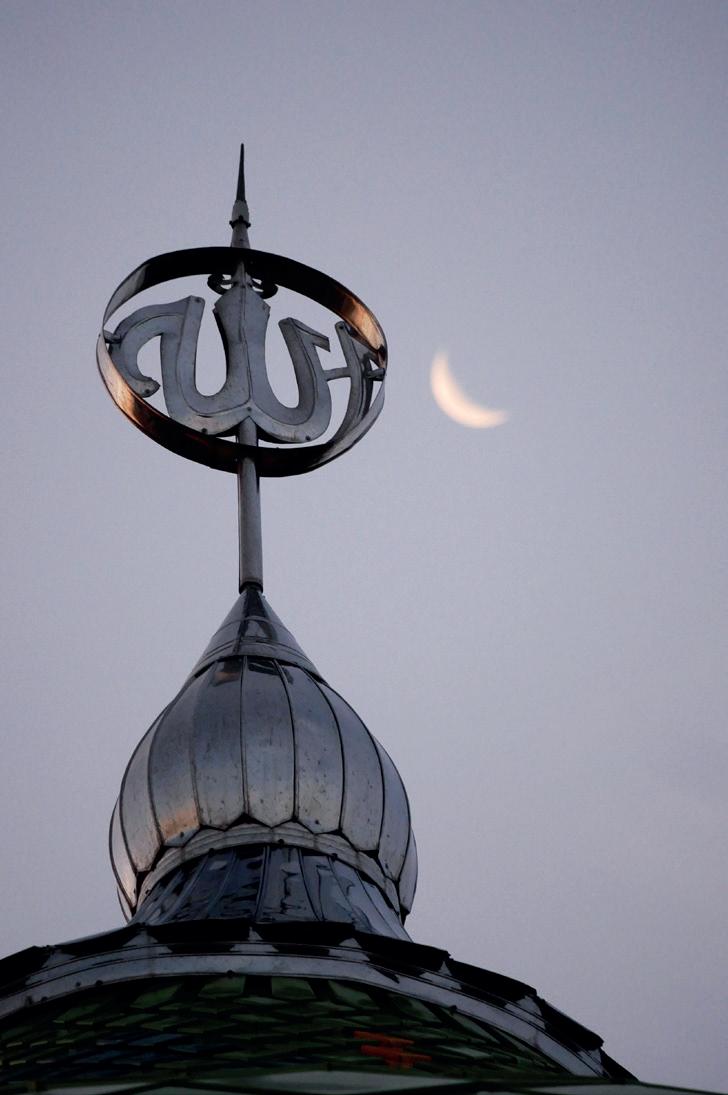
When al-Ahad (The Unique) and alWāhid (The One) are contrasted, al-Wāhid emphasises the meaning of The First. The Quran uses two words to express the Unity of God, Ahad and Wāhid. Whereas Ahad denotes the absolute Unity of God without relation to any other being, Wāhid means “the first” or “the starting point” and requires a second and a third to follow it. The name Wāhid (One) is thus intended to show that God is the real “source” from which all creation springs. Everything points to Him, just as a second or a third thing necessarily points to the first. (The Holy Quran with English Translation and Commentary, 13:17, p. 1499)
Al-Wāhid (The One) is related to alKhāliq (The Creator) because if the name alWāhid (The One) is denied, it would mean there could be other creators before Him. Thus, al-Wāhid (The One) is evidence of Allah being not just the Creator, but also the Sole Creator. (Tafsir-e-Kabir, Vol. 3, p. 403)
This name is also mentioned under alAhad (The Unique).
Use in prayer
We can pray using the name al-Wāhid (The One) to remind ourselves that everything is connected to Allah Almighty. For example, if we start thinking about the weather while we’re praying, we can say Yā Wāhid (O One!) and pray to the One who is its source. Step by step, we bring those thoughts of nature back to their singular Creator, the cause of all causes. Or, we might start thinking about what we need to put on our grocery list. We can instead take that thought and be grateful to Allah Almighty who is alWāhid (The One) and is the ultimate source of those provisions. Rather than fighting against our distractions, we can work with our distractions. This exercise gradually becomes more intuitive. Eventually, what was a distraction away from Allah Almighty becomes a reminder of Allah Almighty. Even if our mind wanders in ten different directions, all of those paths lead back to alWāhid (The One), He who is both The First and The One.
113. Yā Ahad - O Unique! - دحأ اي Meaning
Al-Ahad means the One, the Sole, the Indivisible, and He who has no second.
(Lane’s Lexicon, Root: دحا - Entry: دحأ)
Similar names
While the word wāhid can be used about a person or object, ahad is unique because it is used only for Allah Almighty and not for any person or object. (Lisan al-‘Arab, Ibn Manzur, Root: دحو)
Al-Ahad (The Unique) signifies the
Oneness of Allah in His essence, the idea of a second being inconceivable. Al-Wāhid (The One) signifies the uniqueness of Allah in His attributes. Allahu Wāhid means that Allah is that Supreme Being Who is the Source and Fountainhead from Whom all creation has emanated. Allahu Ahad means that Allah is that Being Who is One and Alone in that when we think of Him, the very idea that there is any other being or thing is absent from our minds. He is One and Alone in every sense. He is neither the starting link of any chain, nor its last link. Nothing is like Him nor is He like anything else. (The Holy Quran with English Translation and Commentary, 112:2, p. 3469)
Use in prayer
For us to connect with Allah Almighty, His manifestations are brought down to our level. For this reason, any name that describes Allah Almighty’s interactions with us does not manifest His true glory. For example, Allah’s manifestations of ar-Rahīm (The Merciful) are limited to the mercy that we, as humans, are capable of receiving from Him. The true reality of ar-Rahīm (The Merciful), which is independent of us and related to His being al-Ahad (The Unique), is beyond our comprehension. The name alAhad (The Unique) is different from other names because it describes Allah Almighty as being unique and alone in a way that is completely independent of our limitations. (Tafsir-e-Kabir, Vol. 10, p. 529)
When we think of all the names of Allah Almighty and everything we know about Him, the name al-Ahad (The Unique) reminds us that we have not begun to comprehend His essence. When we say Yā Ahad (O Unique!) in prayer, we stand dumbfounded in the presence of the One who is beyond our understanding.
114. Yā Allāh - O Allāh! - هللا اي Meaning
The word Allāh is a proper name that is not derived, the “al” being inseparable from it. It is applied to the Being who exists necessarily, by Himself, comprising all the attributes of perfection and all the beautiful names. (Lane’s Lexicon, Entry: هللا)
In the Arabic language, this word is never used for any other being or thing. No other language has a distinctive name for the Supreme Being. The names found in other languages are attributive or descriptive. Allah is always used in the singular. (Dictionary of the Holy Quran, Malik Ghulam Farid, p. 28)
Similar names
In the Holy Quran, Allah Almighty has described His name, Allah, as combining in itself the attributes of all other names and qualities. No other name has been given this rank. Thus, the name Allah comprehends all other perfect attributes. (Barahin-eAhmadiyya Part 4, Ruhani Khazain, Vol. 1, pp. 435-6)
Use in prayer
Any name is meaningless to us if we don’t know someone with that name. For example, if we don’t know anybody named Zaid, Zaid is a meaningless word to us. However, if someone close to us is named Zaid, that person comes to mind when we hear their name. We picture his face along with who he is. The name Allah can only be meaningful to us if we know Him. The degree to which we are familiar with Allah is the degree to which this name will carry meaning for us.
There is, however, a difference between how we recognise people and how we recognise Allah Almighty. We see people’s beauty first, and we see their characteristics after. The beauty of a person is visible, but their characteristics are hidden. However, with Allah Almighty, we see His characteristics first and His beauty after. His beauty is more hidden than His characteristics. (Ta‘lluq Billah, Anwarul-ulUlum, Vol. 23, p. 208)
When we hear the name of someone we are barely acquainted with, only their face comes to mind, but when we hear the name of someone we are close to, their characteristics come to mind. In the initial stages of spirituality, when Allah is only an acquaintance, hearing His name brings to mind the attributes we know or have interacted with. As we increasingly experience His favours, we start to understand the Being behind those favours. The more we get to know Allah Almighty through understanding and experiencing His attributes, the more we see His beauty. Eventually, when we hear the name of Allah, it is His “face”, or beauty, that comes to mind.
When we say Yā Allāh (O Allāh!), it should bring with it a spontaneous recognition of who we are addressing. Allah Almighty says, “True believers are only those whose hearts tremble when the name of Allah is mentioned.” (Holy Quran, Surah al-Anfāl 8:3) There should be a flow of thoughts and emotions based on our experiences with Him. When we recognise who we are addressing, then the words Yā Allāh (O Allāh!) carry a feeling of intimacy.
The Holy Prophetsa said that if Allah Almighty is called on by His greatest name, He answers. (Jami‘ at-Tirmidhi, Kitab adda’wat ‘an Rasulillahsa) The greatest name of God Almighty is Allah. All His other names refer to the name Allah, and He has kept all other names subordinate to this name. (Malfuzat, Vol. 1, p. 154; Vol. 2, p. 88)
The name Allah is covered last in this series of articles because, after we have covered His other names, we have a new familiarity with and recognition of Him. The word Allah now means something new to us.
When we say Yā Allāh (O Allāh!), we bring to mind that Being Whom we have come to recognize, and we pray to Him with a feeling of familiarity.
11 AL HAKAM | Friday 1 September 2023
Masjid Pogung Raya | Unsplash
Dopamine rush: Exploring the neurobiology of addiction
 Dr Hamaad Muin Ahmad Junior Doctor, UK
Dr Hamaad Muin Ahmad Junior Doctor, UK
Addictive behaviours are now wellestablished in society and are the root cause of a myriad of disorders. Addiction can be commonly misunderstood to mean only addiction to drugs or alcohol, otherwise known as substance addiction. However, the World Health Organization (WHO) now categorises gaming and gambling as ‘disorders’. In the International Classification of Diseases 11 (ICD-11) endorsed for release by the WHO in 2019, the WHO defined these addictions as disorders:
“Based on similarities in symptomatology, epidemiology, and neurobiology, gaming disorder and gambling disorder are categorized as disorders due to addictive behaviours in ICD-11.” (www.who.int/health-topics/ addictive-behaviour#tab=tab_3)
In the modern world, addictions can range from substance addictions, including alcohol and drug abuse (such as cocaine and methamphetamine), to behavioural addictions, such as digital gaming, viewing pornography, gambling, or even extensive mobile phone use.
Dr Andrew Huberman beautifully defines addiction as “a progressive narrowing of the things that bring you pleasure.” Essentially, one becomes numb to anything else in life other than the addiction, which has become the sole source of their pleasure.
If not controlled, addictions can be detrimental to our dopamine brain circuits. In our brains, we have the mesocorticolimbic pathway, which is sometimes referred to as the reward pathway as it is a dopaminergic pathway (a path of neurons with dopamine as a neuromodulator). It is responsible for motivation, reward-related behaviour, and attention.
When we are seeking a task that, in
turn, will increase our dopamine levels, our dopamine levels initially increase with the idea of pursuing this task. For example, if one is thinking of going to eat a specific cuisine they highly enjoy, their dopamine levels will go up steadily when the thought initially comes. From this rise, until the action is performed, their dopamine drops towards the baseline. This drop will make the individual want and crave that dish. Once they have eaten the dish, their dopamine levels increase in proportion to how fulfilling and pleasurable the experience was. Dopamine levels increase, causing joy and euphoria. If the dish is not as good as hoped for, the dopamine levels drop, thus causing low mood.
When an addiction initially starts, the individual gains a lot of pleasure from it. Later on, when experiencing subsequent dopamine hits, their perception of pleasure will eventually narrow to that thing to which they are addicted. Consequently, their interest and motivation in everyday tasks such as school, work, and normal hobbies

diminish. If the addiction carries on long enough, they will also eventually lose the dopamine hit that they’re addicted to. The neurobiology behind this will be of great assistance in explaining this further.
This brain circuit physiology is incredibly important when talking about addictions. If a person is addicted to a substance or a behavioural act, the pursuit of that task, which results in a dopamine spike, is analysed and learned by the mesocorticolimbic pathway. The mesocorticolimbic pathway eventually memorises that pursuit for the dopamine spike and stores it. For example, if a person is addicted to a substance that causes a dramatic peak in dopamine, the steps performed to hit that dopamine peak are very short. Eventually, after performing that act many times, the brain circuit, and thus your main brain reward pathway, becomes ‘hardwired’ into thinking that the easiest way to access dopamine is via that act. The brain will now no longer be used to long, gruelling hours of writing an essay, performing physical activity, or studying long hours.
In a nutshell, it will not understand the concept of delayed gratification at all. The brain now only wants the quick dopamine spike from the easy route it has learnt.
Another incredible point that clearly displays the vicious cycle of addiction is the example of gaming. For a person who loves gaming, the act of gaming will increase dopamine roughly three to fivefold. Now, a general rule of thumb is that the steeper and faster the dopamine spike, the steeper and deeper the drop below baseline. So, after this spike, the dopamine levels plummet. The gamer then experiences melancholy, emptiness, and low motivation.
As stated before, low dopamine levels naturally trigger the brain to seek an increase in dopamine. To fulfil this easy dopamine access, the gamer then turns on the game again – the brain now naturally
understands this to be an easy pursuit to attain a dopamine spike.
Neurobiology has explained that when seeking dopamine from the same act as before, dopamine does not increase as high as it did when initially performing the task for the first time. On the other hand, it actually drops even lower than before and experiences a deeper trough. Consequently, in subsequent voyages to seek those dopamine spikes, the addict will experience lower highs and even lower troughs. This vicious cycle is incredibly dangerous and is the neurobiological explanation for the vicious cycle that extreme addicts eventually enter.
It becomes clear why the WHO categorises addictive behaviours as disorders.
In a normal working week, if a person is constantly doing activities they enjoy and does not practise moderation, they’re constantly accessing those dopamine hits, and consequently, their dopamine synaptic reserve drops. Eventually, they constantly feel down because those activities do not produce those dopamine hits anymore –since there is no more dopamine reserve left as it is all being used up.
The world today is a complete depiction of this. The same old dull routine in one’s life results in a person’s brain being numb to the world, and nothing brings them delight as it used to because they’ve exhausted every worldly route to gain happiness.
In the Holy Quran, Allah the Almighty tells us that He has created us with the purpose of worshipping him. (Surah adhDhariyat, Ch.51: V.57) Thus, if our main life purpose is to worship Allah and develop a living relationship with him, then our perception of our life goals completely changes. Islam teaches us that our ultimate reason for living is not to acquire the pleasures of the world but to gain nearness to Allah.
The journey towards attaining the pleasure of Allah has no end at all. In contrast, the pleasures of this world do have an end, and the behavioural addictions that crop up in everyday life negatively impact our dopamine levels, thus negatively affecting our mood and motivation.
Hence, if a believer develops the mindset of working towards a relationship with God – a relationship that ultimately is eternal and infinite because God Himself is eternal – then one’s dopamine baseline will not experience those lows.
The goals, pleasure, and ultimately the dopamine acquisition of believers will now be completely different from those of a non-religious person. The dopamine spikes (which are now the product of delayed gratification) will be derived from experiencing the pleasure of gaining God’s nearness – something that is infinite and has no end.
Friday 1 September 2023 | AL HAKAM 12
Madison Oren | Unsplash
Myriam Zilles | Unsplash
Awaiting a bloodthirsty Messiah Why Muslims like Adnan Rashid are outrageously wrong
Abdullah Tahir
Jamia Ahmadiyya UK
On numerous occasions, Sunni debater Adnan Rashid has expressed the disturbing belief that when Jesusas, son of Mary, returns, he will give people two choices: Islam or death.
In a recent debate at Speakers Corner, he said: “He [Jesusas] will come and give the Ahl-ul-Kitab [People of the book] two options: death or belief. Belief in what? Belief in him [Jesusas], because he’s the bone of contention.” (www.youtube.com/ watch?v=Xbzzxx7h_K8, 00:19:25)
In a live stream held a week later, he doubled down on this belief on three separate occasions.
He claimed that: “All the reports we have about the second coming of Jesus Christ are about Jihad, that he will come back and he will fight the enemies of Allah.” (www.youtube.com/watch?v=1p7Sy2Pyy7g, 2:39:20)
When presented with the clear hadith of Sahih al-Bukhari which states that the Messiah would not wage war, but would come to end it, he continued espousing this view.
He also said: “When we read all the ahadith about the Prophet Isa[as] and his return, every single one of them is talking about physically fighting the enemies of Allah. He will be fighting Dajjal, he will be fighting the forces of Yajuj and Majuj, he will be fighting injustice; he will be fighting, fighting, fighting. So, yadha-ul-harb has to be read in light of those reports.” (Ibid., 3:09:52)
Every single hadith does not mention that he will be fighting. Instead, other ahadith describe different attributes and signs of the Messiahas. Some speak about the location he will appear, some about his works, and others about his circumstances.
He continues to say: “Even though it is yadha-ul-jizyah – that he will remove the
jizya (tax for non-Muslims under Muslim rule) – it means he will give people (the Ahlul-Kitab) two choices, either you accept him or you fight him.” (Ibid., 3:10:50)
This is in line with the view of the elders of the Ahl-ul-Hadith, who believe in a bloodthirsty warrior Messiah who would wage war, plunder the lands of Christians, forcing them to accept Islam with the sword, and carry out widespread massacres and bloodshed.
This belief is highly problematic for a number of reasons.
1. It is un-Islamic to force someone to convert to Islam
2. It supports a violent and extremist worldview akin to terrorism
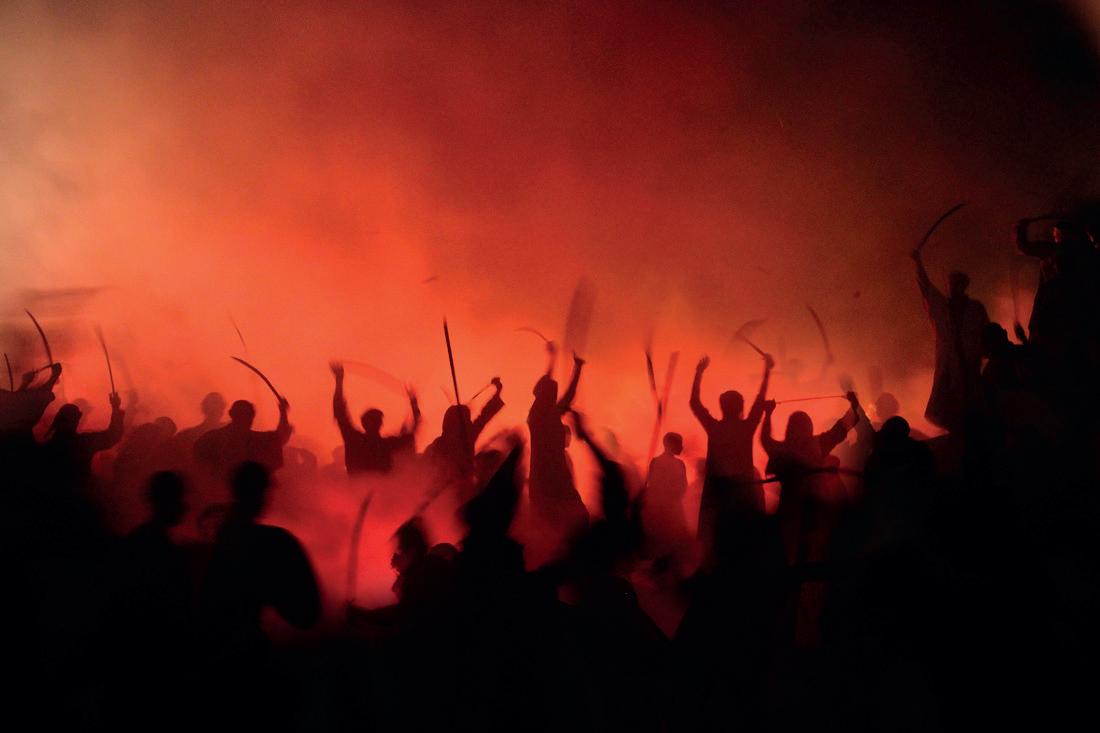
3. It goes against the established practice of the prophets Adnan, while living peacefully in a Christian land and spreading his religion, eagerly awaits the coming of a bloodthirsty Messiah who will force people to accept Islam with the sword. Although he claims to be a human rights activist in his Twitter bio, he secretly, or not so secretly, holds this extremist belief of a terrorist Messiah who will compel everyone to accept Islam. This notion that he will force the disbelievers to become Muslims is baseless. There is no verse in the Holy Quran that supports this idea. On the contrary, the Holy Quran teaches us the complete opposite:
1. “There should be no compulsion in religion. Surely, right has become distinct from wrong; so whosoever refuses to be led by those who transgress, and believes in Allah, has surely grasped a strong handle which knows no breaking. And Allah is All-Hearing, All-Knowing.”
(Surah al-Baqarah, Ch.2: V.257)
2. “For you your religion, and for me my religion.” (Surah al-Kafirun, Ch.109: V.7)
3. “We know best what they say, and thou hast not been appointed to compel them in any way. So admonish, by means of the Quran, him who fears My warning.”
(Surah Qaf, Ch.50: V.46)
4. “And if thy Lord had enforced His will, surely, all who are on the earth would have believed together. Wilt thou, then, force men to become believers?” (Surah Yunus, Ch.10: V.100)
5. “And say, ‘It is the truth from your Lord; wherefore let him who will, believe, and let him who will, disbelieve.’” (Surah alKahf, Ch.18: V.30)
6. “Call unto the way of thy Lord with wisdom and goodly exhortation, and argue with them in a way that is best.”
(Surah an-Nahl, Ch.16: V.126)
Other verses from the Holy Quran (Ch.3: V.56, Ch.5: V.15 and Ch.5: V.65) reveal that disbelievers will always remain on the earth until the Day of Judgement.
God forbade the Holy Prophetsa to force people to convert to Islam, yet, according to Sunnis, his Messiah will disregard the Holy Quran and will have more authority and power than the Holy Prophetsa to make people believe (we seek Allah’s refuge from such beliefs). He believes that the shariah of the Quran is the final unalterable law, yet according to him, the bloodthirsty Messiah will have the power to change it.
His Messiah will call towards Islam with no wisdom or goodly exhortation, but rather he will be forceful, and even slaughter those who are against him.
For any right-minded sincere Muslim, the above verses are enough to debunk this false ideology.
This dangerous belief is the root cause of the many terrorist groups created by so-called Muslims. Do these people never wonder why such extremist groups are born among them and not among us? And why is he introducing changes to the laws of Islam and disregarding clear Quranic verses?
The Founder of the Ahmadiyya Muslim Jamaat, Hazrat Mirza Ghulam Ahmadas addressed this issue in his own writings and explained why Ahmadis could never hold such a false belief. He writes:
“Do they await the warrior Messiah and Mahdi so that they may spill blood –killing all enemies and smiting their necks – and to spread Islam by the sword? This is not, however, proven by the authentic hadith, or from the text of the Holy Quran; in fact, the opposite has been proven by the scholars.” (The True Nature of the Mahdi, p. 53)
Authentic ahadith narrate that the Messiahas will be ًالْدَع اًمَكَح i.e. a just arbiter who will judge mankind with justice (Sahih al-Bukhari, Hadith 3448) and will be اًمَكَح اًطِسْقُم i.e., a just judge. (Sahih Muslim, Hadith 155a)
In another narration of Sahih al-Bukhari, it is said that the Messiah will abolish war. Can a mass slaughterer of innocent people be called just? Adnan’s beliefs are patently against the Holy Quran and authentic ahadith.
The Promised Messiahas states:
“Furthermore, these facts are denied by the sound mind and rejected by straightforward thinking – so ask those who reflect. You are aware that this era of ours is one in which no one attacks us with swords and spears on account of our religion. No one forces us to recant the Religion of Allah – the best of religions – and follow another religion. So in these days, we do not require war and reprisal; there is no need for lances to be prepared and swords to be unsheathed.” (The True Nature of the Mahdi, p. 53)
The latter-day Messiahas was never going to raise the sword and shed blood to spread Islam. Instead, he would end wars and conflict by spreading the message of Islam through peaceful means, creating an environment of love and harmony.
This is how the Ahmadiyya Muslim Community is changing hearts and spreading the message of Islam to the far corners of the earth.

13 AL HAKAM | Friday 1 September 2023
Hasan Almasi | Unsplash
Hatice Güven Yeşilyurt | Unsplash
Islam Ahmadiyyat echoes in early 1900s German newspapers
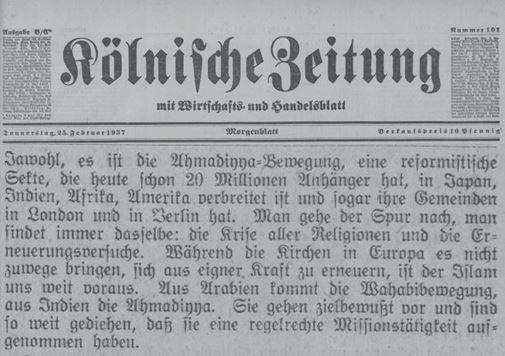
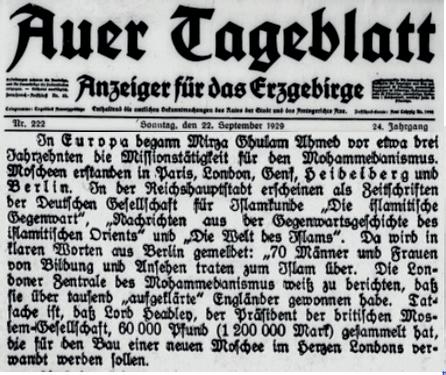
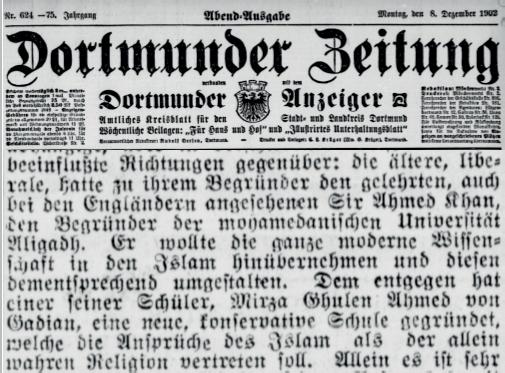
Ata-ul-Haye Nasir
Al
Hakam
Hazrat Mirza Ghulam Ahmadas of Qadian, the Promised Messiah and Mahdi, states:
“God Almighty desires to draw all those who live in various habitations of the world, be it Europe or Asia, and who have virtuous nature, to the Unity of God and unite His servants under one Faith.” (The Will [AlWasiyyat], pp. 8-9)
The writings, claims and prophecies of the Promised Messiahas had reached far and wide during his life through various periodicals around the world, and this continued after his time as well.
We found several German newspapers, which served as a means to spread the message of the Promised Messiahas
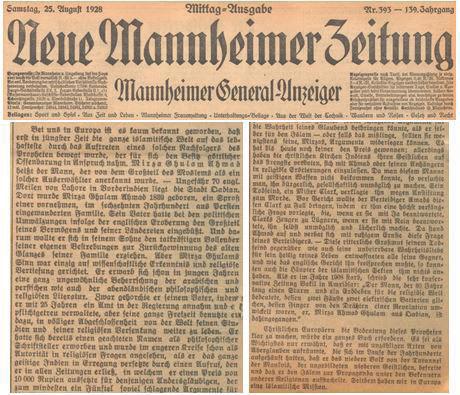
It is worth acknowledging that the newspapers might incorporate particular perspectives pertaining to Ahmadiyyat based on their own comprehension or convictions. Consequently, such interpretations should not be misconstrued as a comprehensive or accurate representation of the viewpoints or beliefs espoused by the Ahmadiyya Muslim Community.
Some examples from those newspapers are given below [translated from German]:
In 1902, a German newspaper, Dortmunder Zeitung, wrote that there were two schools of thought prevalent among the Muslims in Northern India. Firstly, the liberal one led by Sir Syed Ahmad Khan who “wanted to take all of modern science
into Islam and transform it accordingly.” On the other hand, “Mirza Ghulam Ahmed[as] of Qadian, founded a new, conservative school, intended to champion the claims of Islam as the one true religion.” (Dortmunder Zeitung, 8 December 1902, p. 11)
The Deutsche Allgemeine Zeitung, in its 16 August 1923 issue, mentioned the foundation laying ceremony of the proposed Berlin Mosque [which took place on 6 August] and stated how Ahmadis were opposed by non-Ahmadi Muslims. It gave a detailed introduction of the Promised Messiahas and Khilafat-e-Ahmadiyya under the heading “Zur Ahmadia-Bewegung” –About the Ahmadiyya Movement:
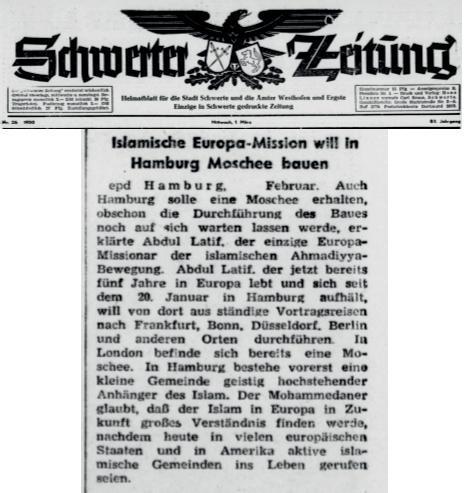
“The Founder of the Ahmadiyya Movement, Mirza Ghulam Ahmad[as], of an ancient noble family of MongolianPersian blood, lived in Qadian (hence known as Qadiani) from 1836 to 1908, in the Punjab (North India). He was an undoubtedly strong, deeply religious, and moral personality. In the spirit and words of Jesus and grounded in Islamic principles, he preached religious and moral renewal and enhancement to his Muslim co-religionists, as well as Christians, and Hindus. The consciousness of a task assigned to him by
God deepened in him around 1890, to the point that he, who worked in the spirit and in the power of Jesus, was the Jesus whose return is promised, at the same time the Mahdi awaited by the Muslims, and also a [second coming] of Krishna. He performs miracles and predicts the future. Among the eighty books and writings published by him in Urdu, Arabic and English, there are those that [...] focus solely on Islamic principles, and have had a far-reaching impact. This includes his ‘[The Philosophy of the] Teachings of Islam’, which was originally written in Urdu and presented at the Great Religious Conference in Lahore in 1896. It is repeatedly printed in English, and a German translation is to be published shortly. Nevertheless, the emphasis on the divine mission of the Promised Messiah has a special effect. A follower of Ahmadiyya commits himself to the Laws of Islam, the Holy Quran and the traditions (Hadith). He acknowledges Muhammad[as] as the Seal of the Prophets. [...]
“The Ahmadiyya movement has meanwhile developed robustly. The leadership continues to stay in Qadian, where the deceased [Promised Messiahas] had a first successor (Khalifa) in the person of Maulvi Noor-ud-Din[ra], and the present Khalifa Mirza Bashir-ud-Din Mahmud Ahmad[ra] succeeded him. The foremost duty of an Ahmadi is the ‘spreading of Islam.’ Among the Master’s [Promised Messiahas] prophecies are those that the majority of the people of Europe will convert to Islam and believe in Ahmad[as] so that eventually the Ahmadiyya Movement will prevail all over the world. So the religious ardour of the Master lives on in a far-reaching missionary activity in West Africa, America, London, and now Berlin. The costs for the mosque that is about to be built here in Berlin are entirely borne by Ahmadi women who sacrificed their money and jewellery.”
(Deutsche Allgemeine Zeitung, 16 August 1923, p. 2)
The Neue Mannheimer Zeitung published an article by Ernst von Wolzogen, titled “Was man vom Islam wiffen sollte” – What you should know about Islam. Mentioning the Promised Messiahas, he states:
“Among us in Europe, it is hardly known that only recently the whole Islamic world was vividly moved by the appearance of such a successor of the Prophet [Muhammadsa] who claimed to possess the power of Divine revelation. Mirza Ghulam Ahmad[as] is the name of the man recognised by many Muslims as such a chosen one. About 70 English miles from Lahore in [British] India lies the town of Qadian. Mirza Ghulam Ahmad[as] was born there in 1839 [sic. 1835], to a noble family who had emigrated from Persia in the sixteenth century. [...] At a young age, he acquired a quite unusual mastery of Arabic and Persian, as well as Western philosophical and religious literature. Although he obeyed his father by accepting
an office in the government at the age of 25 and administering it dutifully, he used all his free time to continue his studies and religious immersion in complete isolation from the world. He had already earned a respected name as a philosophical writer and was already considered an authority on religious matters in the narrower circles when he stirred up all of spiritual India with an appeal, issued in all the newspapers, offering a prize of 10,000 rupees for those of other faiths who could present at least one-fifth as many convincing arguments for the truth of their faith as he could for Islam – or if that fails, they should at least be able to refute his, Mirza’s arguments. To date, no one has won the award. Moreover, the Christian churches of India have strictly forbidden their clergy to engage in religious discussions with Ahmad[as] or his followers. Since this man could not be attacked with intellectual weapons, attempts were made to ostracise him both socially and civically. His opponent, a Mr. [Henry Martyn] Clark, sued him for incitement to murder. In court, Ahmad’s[as] defence attorney wanted to bring down Clark by presenting him with a highly perilous question that, if he answered yes, would make Clark’s witnesses liars, if he answered no, he would make it impossible and ridiculous for himself. Then Ahmad[as] stood up and calmly and earnestly forbade his defence attorney’s question. This knightly magnanimity towards a mortal enemy [...] disarmed all his opponents, and as the English court had to acquit him, so the heads of the Islamic sects could not have anything against him. When he passed away in 1908, the very conservative newspaper Vakil in Amritsar wrote: ‘The man who for 30 years spelled a storm and a quake in the religious world, whose two fists resembled two electric batteries, and fingers entwined with the wires of a revolution, he, Mirza Ghulam Ahmad[as] of Qadian, has passed away.
“To make the significance of this Prophet clear to Christian Europeans would require an entire book. Most importantly, he swept away innumerable kinds of superstitions that had accumulated over the centuries, freed the common people from the tyranny of the Maulvis, the ignorant, lowly clerics, and stirred up Islam for propaganda among the followers of other religions. Since then, we have had an Islamic mission in Europe.”
(Neue Mannheimer Zeitung, 25 August 1928, p. 8)
The Auer Tageblatt: Anzeiger für das Erzgebirge wrote:
“In Europe, Mirza Ghulam Ahmed[as] began the missionary activities for Mohammedanism [sic., Islam] about thirty years ago. Mosques sprang up in Paris, London, Geneva, Heidelberg, and Berlin. [...] The London headquarters of Mohammedanism reports that they
Friday 1 September 2023 | AL HAKAM 14
Continued on next page >>
Dortmunder Zeitung, 8 December 1902
Auer Tageblatt: Anzeiger für das Erzgebirge, 22 September 1929
Schwerter Zeitung, 1 March 1950 Kölnische Zeitung, 25 February 1937
Neue Mannheimer Zeitung, 25 August 1928
Pioneer Missionaries Part XII
Venturing Westward: Humble beginnings as missionaries set foot in Europe

A series looking at pioneer missionaries and devotees of the Ahmadiyya Muslim Jamaat who gave precedence to faith over the world.
Saad Hayat
Al Hakam
The message of Ahmadiyyat has continued to spread in both the East and the West since the time of its Founder, Hazrat Mirza Ghulam Ahmad, the Promised Messiahas
After his passing, under the supervision of Khilafat, missionaries were sent to various regions and areas of the world. These righteous individuals, guided by the Khalifatul Masih and supported by his prayers, guidance, and training, entered entirely new regions and atmospheres. These missionaries laid the solid foundations that established the Jamaat’s missions around the world. To illustrate, let’s consider the early days of Europe as an example.
On 26 October 1946, Al Fazl published a report, under the the heading Entry of Ahmadi Mujahideen into the Land of Switzerland, authored by Mr Nasir Ahmad Sheikh, who was the then In-charge of Ahmadiyya Mission Switzerland:
have won over a thousand ‘enlightened’ Englishmen.” (Auer Tageblatt: Anzeiger für das Erzgebirge, 22 September 1929, p. 10)
The Kölnische Zeitung stated:
“Yes, it is the Ahmadiyya Movement, a reformist sect, which today already has 20 million followers and spread in Japan, India, Africa, and America, and even has a community in London and Berlin. If you follow the trail, you always find the same thing: the crisis of all religions and the attempts at reformation. While the churches in Europe cannot manage to reform themselves on their own, Islam is far ahead of us. The Wahhabi movement comes from Arabia, and the Ahmadiyya movement comes from India. They proceed purposefully and have progressed so far that they have taken up regular missionary work.” (Kölnische Zeitung, 25 February 1937, p. 1)
The Schwerter Zeitung wrote under the heading “Islamische Europa-Mission will in Hamburg Moschee bauen” – Islamic European Mission desires to build a mosque in Hamburg:
“Hamburg is also to receive a mosque, although the building work will still be a long time coming, explained Abdul Latif, the only European missionary of the Islamic Ahmadiyya Movement. Abdul Latif, who has been living in Europe for five years now and has been in Hamburg since January 20, wants to make regular lecture trips to Frankfurt, Bonn, Düsseldorf, Berlin, and other locations. There is already a mosque in London. In Hamburg, there
“In the beautiful city of Zurich, Switzerland, the call of ‘Allahu Akbar’ (God is the Greatest) echoed.”
He further writes:
“Having set foot on Swiss soil on Sunday, 13 October [1946], at one o’clock in the afternoon, the three of us (Chaudhry Abdul Latif Sahib, Maulvi Ghulam Ahmad Bashir Sahib, and my humble self, Nasir Ahmad) arrived in the city of Zurich, Switzerland. Before disembarking the train carriage, we prayed to Almighty God, asking Him to grant us success through His special decree and might, and to assist us at every step of the way, so that we may fulfil this profoundly noble responsibility with utmost devotion that has been placed upon our humble shoulders owing to the great obligation of waqf. As we stepped onto Swiss soil, silent prayer was carried out, and the initial words of the message of truth were voiced on this new land. We besought God to bless our words and to make our preaching method a means of attracting good-natured
was initially a small community of spiritual followers of Islam. The Mohammedan [sic; Muslim] believes that Islam will find great understanding in Europe in the future, now that active Islamic communities have been established in many European countries and in America.” (Schwerter Zeitung, 1 March 1950, p. 6)
In 1955, Hamburger Anzeiger published a photo of Hazrat Musleh-e-Maudra and wrote:
“‘Prince of the Faithful’ received at Town Hall
“The head of the Islamic Ahmadiyya Movement, Caliph Hazrat Mirza Mahmud Ahmad [ra] (left), was received by Senator von Fisenne (right) at the Town Hall yesterday. The 66-year-old ‘Prince of the Faithful’, revered as the ‘Promised Reformer’, described at a reception in the Europäischen Hof how the current headquarters of the movement ‘Rabwah’ in Pakistan was founded in 1950 [sic; 1948]. From a village in the middle of a desert, it has developed into a large city with secondary schools and a seminary for Muslims. Islam is the religion of peace and brotherhood and therefore also the right one for Europe and for Germany, Hazrat Mirza [as] explained. As a true international religion, it is now trying to find its way into Germany and win believers for Islam. The spirit of Islam is also alive in Germany, the Prince explained. The Ahmadiyya Movement, whose headquarters in the Federal Republic is in Hamburg, maintains missions in all countries.”
(Hamburger Anzeiger, 28 June 1955, p. 4)
individuals. After checking our luggage, we proceeded to a hotel where arrangements had been made for the first three days.
“There was a distance of a few hundred yards between the railway station and our hotel. However, during this short journey, a considerable number of individuals began to gather around us. They were surprised by our turbans and traditional attire. They probably saw such clothing for the first time. People were looking at each other in awe, pondering over the origins and identities of these newcomers. A few even shared quiet chortles.
“As we stepped into the main city, we encountered a curious and sceptical public. Their amazement will likely wane with time. But for now, there are many obvious reasons for their curiosity. It will take some time for us to master the language and address the intricacies of communication.
“We have brought with us two types of tracts in the German language that have been printed to serve our purpose. These tracts cover matters such as the reasons for our arrival in Europe, Islam’s truthfulness, the arrival of Hazrat Mirza Ghulam Ahmadas, the announcement of Jesus’as tomb, and other related issues.
“We are currently not distributing these tracts because, until we are capable of answering the detailed questions posed in the German language and providing comprehensive explanations during conversations, distributing these tracts will not yield significant benefits. We hope that, insha-Allah, we will soon be able to do so by the grace of Allah the Almighty.”
Meeting with a Bank Director
“Here, in Zurich, an introduction had already been made with Mr Arni, a director of a major bank, who is a close associate of a friend of Chaudhry Sir Muhammad Zafrulla Khan. We went to meet him the next day. He was very friendly. Initially, we requested that he help us find accommodation, as that was our immediate need. In other words, in this relatively important country of Europe, where people from all over the world, and especially those distressed by the war in Europe, come for recreation, our expenses are quite high. Things here are far more expensive than in London. The cost of a cup of tea is approximately eight pence, and accordingly, hotel and other boarding house rents are high. Mr Arni informed us that finding accommodation in Zurich is quite difficult, but he will still make an effort.”
The significance of Zurich

“We also visited the office of Thomas Cook and obtained some information from there,

as well as concluded some essential matters. On 15 October [1946], we went to the office of the British Consul General and registered our names. After that, we walked around the city, familiarising ourselves with the conditions. It is a truly beautiful city. While Bern is the capital of Switzerland, Zurich’s importance and central status exceed those of Bern. It is also the largest city in the country, with a population of only 358000 people. A river flows through it, and there is a vast lake within the city. Some of the population resides in the mountains, but the majority is on the plains. The climate here is colder than England nowadays, and in winter, heavy snowfall and severe colds are quite common.”
The first adhan and Friday prayer
“As I write these lines, we have just returned from the city after offering the Friday prayer. In search of an open place, we ventured far outside the city, ascending into the mountains. When we could not find a suitable spot, we looked towards the forests, and, after nearly an hour of searching, found a high point amidst thick woodlands, beneath a cluster of beautiful trees. There we called the adhan. It was the first adhan in such a manner for the Friday prayer. Following that, we prayed to Allah for the opportunity to construct a mosque in this area. This Friday prayer will forever remain in our memory; it is a testament to our initial and humble state. We hold hope in our Lord that He will accept our feeble supplications and grant us the ability to spread His glorious Message [...]
“These events are a clear testimony to the truthfulness of Hazrat Amirul Momineen[ra] The three servants of the Master have performed Friday prayers in three different countries consecutively: two weeks ago in England, last Friday in France, and today in Switzerland. Does this not serve as evidence for the propagation of the name of the Promised Messiahas?”
A request for prayers
“In conclusion, with utmost humility, I earnestly request the beloved members of the Jamaat to pray that Allah Almighty, through His grace, distances every difficulty from us and grants us success in truly serving His religion. May He be our guide at every step and bless our voices and methods of propagation.” (Al Fazl, 26 October 1946)
As detailed in the aforementioned account, readers are well aware that these pioneering missionaries faced various challenges upon arriving in new territories. For instance, as these missionaries
15 AL HAKAM | Friday 1 September 2023
Awwab
Continued on next page >>
<< Continued from previous page
100 Years Ago...
Eid-ul-Adha in London, 1923
Al Fazl, 28 August 1923
Hazrat Maulvi Abdur Rahim Nayyarra (1883-1948)
Eid schedule
Eid-ul-Adha was celebrated in London on 25 July [1923]. Before Eid, invitation letters prepared by the imam and members of the Ahmadiyya Jamaat London were sent along with the printed schedule to friends and such associates who had shown their interest in the Jamaat.
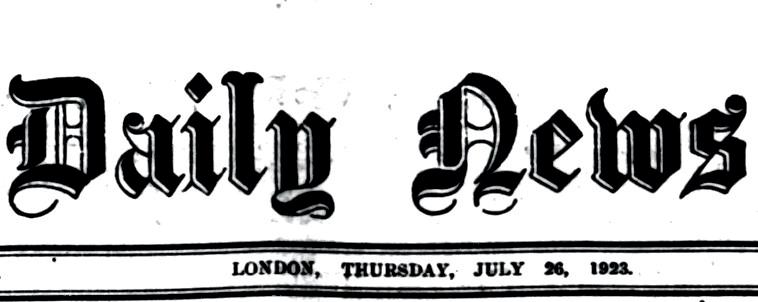
The Eid schedule was as follows:
1. Eid Prayer and Sermon: 11:30 am
2. Eid Mubarak: Greeting each other in an Islamic way and meeting the people from the East and West under the banner of the Holy Prophet Muhammadsa
3. Lunch: 1 pm
4. Tea: 4 pm
5. Keynote Address: By MB Janjua Ahmadi (Barrister-at-Law) of Oxon on Islam as a Cure for Europe’s Diseases
Ahmadiyya Dar at-Tabligh, London
If you want to find the centre of the Ahmadiyya Jamaat in the capital of the British Empire, take a short trip to the heights of Shimla and observe an excellent government bungalow, and keeping that in mind, now envision a great, pleasant piece of land on the suburbs of London, located between the East Putney and Southfields railway stations, which is both within and outside of London [i.e., London’s geographical extent was smaller in 1923, than now that the Ahmadiyya Mosque is in London]. It is a triple-storey cone-shaped house standing apart from the other buildings located in the middle of the greenery-laden orchard. It is known as “Ahmadiyya Mosque” which captivates the heart of the onlooker. The phrase “The Mosque” is written on each of the two folds of its door.
Eid Day activities
On the day of Eid, the orchard and the house were decorated. The door of the mosque was decorated with pots of flowers, and carpets were laid on the tall grass and flat ground of the garden. Plenty of chairs were placed around the carpets for the listeners of the Eid sermon. The refreshments were arranged in the same open area with great care, and all the hygiene measures were taken into account.
Around 90 guests, including Englishmen, Egyptians, Germans, Europeans, and Asian-Africans, arrived on time. At 11 am, the Eid prayer commenced. The sermon was delivered in English. The
imam delivered a sermon on the philosophy of sacrifice and gave the example of Hazrat Ibrahimas and Hazrat Ismailas. It was well received by all the non-Ahmadis and Ahmadi Muslims and was also liked by the non-Muslims. In the sermon, the arrival of the Promised Messiahas and the superiority of the Ahmadiyya Muslim Jamaat were mentioned. After spiritual nourishment, food was served to the guests in the most sublime manner. It is the grace of Allah the Almighty that despite our disassociation from politics, fair-minded people admire the Jamaat. Every participant in the gathering was happy and returned with a positive impact.
Press
Mentioning our Eid-ul-Adha [1923], the Near East newspaper writes:
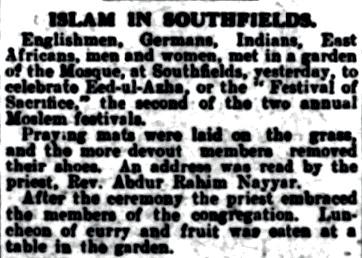
Eid-ul-Adha was celebrated yesterday at the Ahmadiyya Mosque, 63 Melrose Road, Southfields. In addition to the Eid prayer and sermon, a lecture by MB Janjua BA (Barrister-at-Law) of Oxen was held in the afternoon on Islam as a Cure for Europe’s Diseases
The Daily News wrote under the heading “Islam in Southfields”:
“Englishmen, Germans, Indians, East Africans, men and women, met in a garden of the Mosque, at Southfields, yesterday, to celebrate Eed-ul-Azha, or the ‘Festival of Sacrifice,’ the second of the two annual Moslem festivals.
“Praying mats were laid on the grass, and the more devout members removed their shoes. An address was read by the priest [i.e., maulvi], Rev. Abdur Rahim Nayyar[ra]
“After the ceremony, the priest [i.e., Hazrat Maulvi Abdur Rahim Nayyarra] embraced the members of the congregation. Luncheon of curry and fruit was eaten at a table in the garden.” [Daily News, 26 July 1923]
Afternoon gathering
Although there were some difficulties in the arrangements due to the rain, by God’s grace there was still enough space. The mosque’s hall and the place of the mihrab [niche] were combined to make enough room. After the tea party, which was attended by around 120 guests, people gathered for the keynote address. Among those present were Mr and Mrs Dr Henry M. Leon and Mr and Mrs Shaikh Khalid Sheldrake.
Introducing the lecturer to the audience, the Ahmadi missionary, who was also the head of the gathering, mentioned the message and the success of the Promised Messiah’sas [mission]. He then presented the Messiah [of the Age] as the giver of [spiritual] nourishment to the hungry, water [of revelation] to the thirsty, and [divine] light to the dark minds, and drew the
attention of the participants to the glorious fulfilment of his prophecy about London. This was followed by a successful lecture by Chaudhry Maula Bakhsh Janjua Sahib, BA, Barrister-at-Law.
After Chaudhry Sahib, Dr Henry M. Leon gave a short speech. Thereafter, the head of the gathering thanked the attendees and said “Eid Mubarak” to all, and then again drew their attention to the message of the Promised Messiahas. The jalsa concluded with a silent prayer.
Lecture by Chaudhry Maula Bakhsh Sahib
Surely, a nation whose youth has a passion for the propagation of the truth lives forever.
I congratulate Hazrat Khalifatul Masih [IIra] on the true zeal with which his youth residing in England are preaching. Whether they are West Africans, Indians, or South Africans, all of them are sincere Ahmadis. They believe in the propagation of the Promised Messiah’sas message and consider it a force of life for the whole wide world.
Among them, our honourable Chaudhry Sahib stands out. He came to England from Iraq, embarked on a ship instead of a train, and travelled on both water and land to eventually reach London with his family. After moving here, he passed the bar exam, and now, by the grace of Allah the Almighty, he has obtained a BA Hons degree from Oxford. We pray to God Almighty that he will be successful in his work. Moreover, the Ahmadiyya community will see the addition of another barrister, probably in Lahore. This is Chaudhry Janjua Sahib in terms of his abilities, but in terms of sincerity of faith, he is like a mountain. In spite of some severe hostilities, he continued to progress in the way of Ahmadiyyat, the true Islam. Consequently, Chaudhry Sahib, in a country where a great defamer of Ahmadiyyat once said, “Taking the name of Ahmad (peace be upon him) here [in the UK] is like a deadly poison” while mentioning Islam as a Cure for Europe’s Diseases, openly expressed before the audience under the roof of the Ahmadiyya Mosque that:
“Seeing Europe in an entirely corrupt cultural, political, moral, and religious state, God sent a great prophet. He appeared in the personage of Ahmadas of Qadian. His message of Islam is the lifeforce for Europe.”
This lecture was very successful by the grace of Allah the Almighty.
Miscellaneous
On the occasion of the Treaty of Lausanne, a congratulatory message was sent to His Excellency, Ismat Pasha. His Excellency gave the following reply:
“Imam of Ahmadia Mosque Islamabad, London. Hearty thanks for your kind message. Ismat.”
His Majesty, the King of Great Britain, visited our district on 28 July [1923]. He was presented with a message of welcome. Its handwritten reply has been received from the Home Secretary of the Kingdom of Great Britain. The King and Queen turned to this humble one and answered the greetings in a very affectionate manner.
On the occasion of Eid-ul-Adha, messages of congratulations and greetings were received from His Excellency, the Minister of Afghanistan, and His Excellency, Musa Kazim Pasha, the chairman of the Palestine delegation.
(Translated by Al Hakam from the original Urdu, published in the 28 August 1923 issue of Al Fazl)
<< Continued from previous page
mentioned above, Haji Ahmed Khan Ayaz Sahib narrates that when he left Hungary and arrived in Warsaw, the capital of Poland, on 22 April 1936, after three days, he resided in a hotel because he couldn’t find suitable rented accommodation. Eventually, he succeeded in obtaining a room in a new settlement, which was seven miles away from Warsaw. (Tarikh-e-Ahmadiyyat, Vol. 7, p. 293)
Bear in mind that these challenges could not deter these missionaries from their path. For instance, when the same Haji Ahmed Khan Ayaz Sahib was sent as a missionary in 1936, the result of a continuous year of hard work became evident to everyone.
In an article in the newspaper Pastimaplo, published on 18 April 1937, just a year after his arrival in Budapest, the capital of Hungary, a female columnist provided a detailed introduction to Ayaz Sahib and stated that only a year had passed since his arrival in Budapest. During this time, he had spoken to representatives of various newspapers and had made astonishing progress in learning their language. He had achieved such high levels of success that more than a hundred Hungarians had embraced Islam by the time.
(Al Fazl, 15 November 2001)
Friday 1 September 2023 | AL HAKAM 16
Daily News, 26 July 1923
Friday Sermon
Baitul Futuh Mosque, Morden, UK
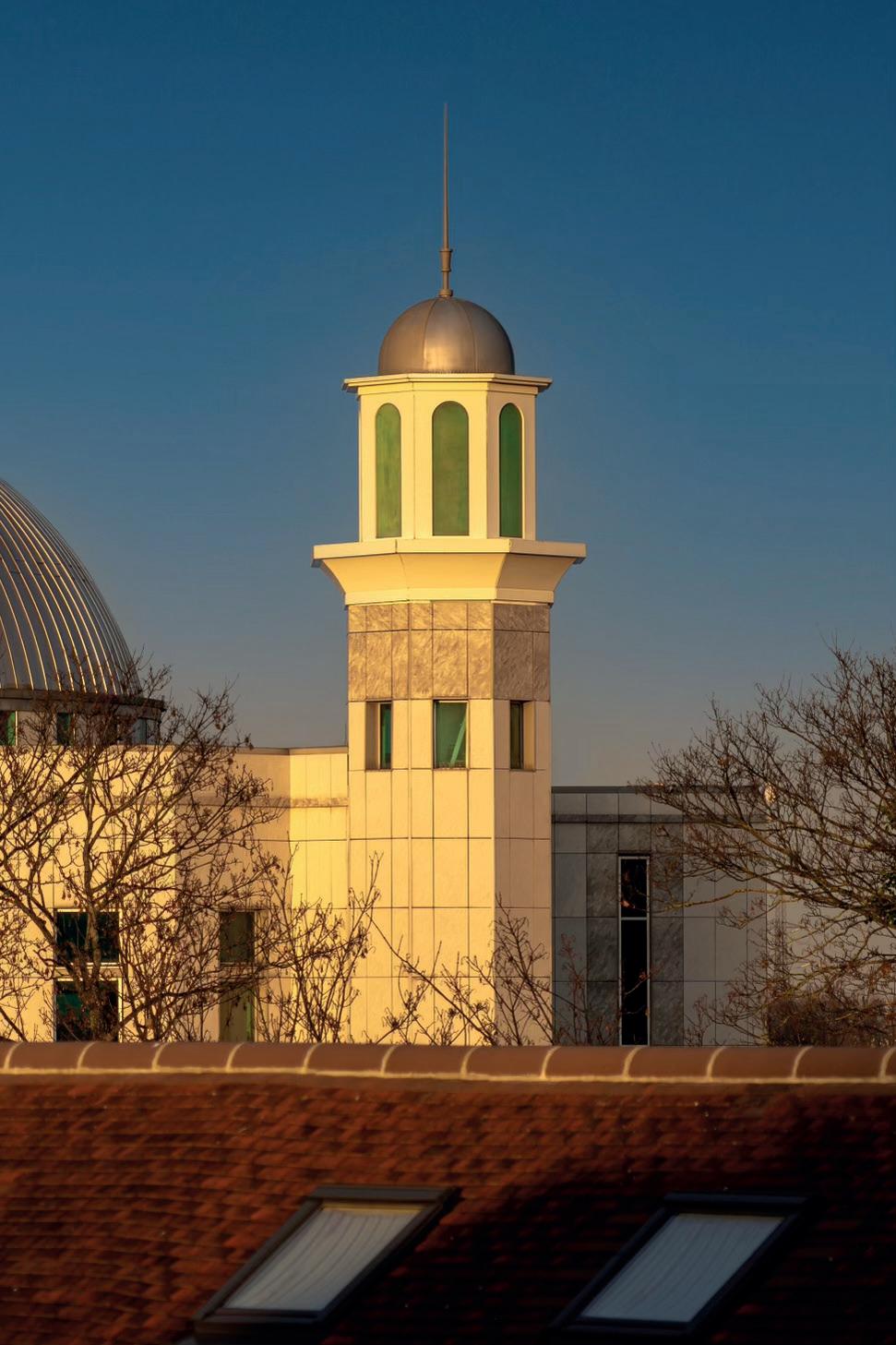
4 August 2023
Jalsa Salana UK 2023: A most successful culmination
After reciting the tashahhud, ta‘awwuz and Surah al-Fatihah, Hazrat Khalifatul Masih Vaa stated:
Alhamdulillah [all praise belongs to Allah]! By the grace of Allah the Almighty, the Jalsa Salana [annual convention] of Jamaate-Ahmadiyya UK was held successfully on the previous Friday and came to a conclusion on Sunday. Despite the weather being unfavourable at times, by the grace of Allah the Almighty, overall everything was organised and managed without any major concerns. Additionally, the attendance this year was far greater than in the previous year. Hence, we will never be able to truly thank Allah the Almighty for this. He filled our Jalsa with countless blessings, and everyone experienced them, whether they were Ahmadi guests, or non-Ahmadi guests, who were in attendance from various countries.
We are weak. Whatever we accomplish is through the blessings of Allah the Almighty and these are showered upon us to such an extent that we are unable to count them. We witness the [fulfilment of the] following statement of Allah the Almighty at all times:
“And if you [try] to count the favours of Allah, you will not be able to number them. Surely, Allah is Most Forgiving, Merciful.” (Surah an-Nahl, Ch.16: V.19)
Thus, Allah the Almighty overlooks our shortcomings and blesses us in ways and through means for which we can never do justice in expressing gratitude to Him. Nevertheless, we are commanded by Allah the Almighty to continue to be thankful to Him, and if you do so, He will bless you even more. Thus, it is our responsibility to be grateful for the favours of Allah the Almighty and to submit before Him. As long as we fulfil this responsibility of ours and continue to consider the success of our undertakings to be the mercy and blessings of Allah the Almighty, we will continue to stride forward, insha-Allah. Hence, for the success of this Jalsa, we should first and foremost be grateful to Allah the Almighty, and we should also seek forgiveness
from Him for our shortcomings in its organisation.
Similarly, all the participants should also be grateful to Allah the Almighty for granting them the opportunity to participate in the Jalsa and quench their spiritual and intellectual thirst. Generally, everything was conducted with ease, despite the fear that Covid had not yet completely disappeared. Despite such a large gathering, on the whole, Allah the Almighty kept us under His protection. May Allah the Almighty keep everyone under His protection afterwards as well. Some people fell ill after Jalsa, in fact, they became unwell two or three days after Jalsa, not immediately. May Allah the Almighty grant them health and protect them. As far as I am aware, there are very few individuals who have contracted this virus. In my opinion, this is not due to the Jalsa, rather, the government has made a general announcement that cases are increasing in some places. Now this virus is similar to other illnesses that increase and decrease. In any case, may Allah the Almighty cure everyone who is ill.
I now wish to thank all the workers. This time, overall, everyone fulfilled their duties in an excellent manner, and on top of that, with a smile on their faces, in line with the instructions I gave them in the beginning. May Allah the Almighty reward them all. This time, the workers in all departments displayed a special expertise while carrying out their duties, both on the men’s and women’s sides. Every year there are complaints on the women’s side regarding the dining and food supply arrangements, however, on this occasion, these complaints were virtually non-existent. Furthermore, this time the Lajna side was moved in order to have all the facilities in one area, such as the dining marquee and other necessary arrangements, and this was liked by the women in general. If there were any shortcomings, then, insha-Allah, they will be dispelled in the future.
Similarly, there were the departments of traffic, dining, roti plant, security, and
17 AL HAKAM | Friday 1 September 2023
ميحر روفغل هللا نا ؕاہوصحت ال هللا ۃمعن اودعت ناو
Photo courtesy of Suhaib Ahmad
hygiene. Then, most of all, MTA, which connected the world in a new way this time. In any case, the workers in all departments, whether I named them or not, on both the men’s and women’s sides, made great efforts to fulfil their duties. I, therefore, express my gratitude to all of them. The non-Ahmadi guests in attendance expressed their amazement after witnessing the hard work and excellent attitude of all the workers, and this example displayed by all our workers serves as a form of silent and practical tabligh [preaching]. May Allah Almighty grant them all the best rewards. [Amin.]
I only wish to draw the attention of the Jalsa Salana department to one point, and that is that the water was turned off right as Jalsa came to a conclusion; hence, no water was available in the lavatories. At the very least, the water should remain running for another 12 hours. Aside from this, the arrangements were generally much better. What were the remarks of the non-Ahmadis and non-Muslims who attended from other countries? What were their impressions after witnessing the Jalsa arrangements and the Jalsa as a whole? I shall present a few remarks, but it is not possible to present them all.
Professor Dr Diallo Jean of Burkina Faso is a renowned eye specialist and professor at a medical university. He is also serving as a colonel in the army. He also comes regularly to our eye institute, and this is the first time he had the opportunity to attend [the Jalsa]. [He said,] “This is the first time I attended the Jalsa. The first thing I was impressed with was that thousands of people are all gathered in one place, for a single purpose, around one religious leader. Everyone is united, and everyone has the same goal. It was amazing to witness such extraordinary arrangements and people from all backgrounds gathered in one place. I integrated with the guests to work out if it was all true or merely for show; however, I did not see displeasure on anyone’s face. It is incredible to have people from different regions, countries, and nations, from all walks of life, gather for one purpose, in one place, at one person’s hand.”
Hence, this is the way in which the Ahmadi participants in the Jalsa are carrying out tabligh in a practical way to the nonAhmadis. He then says, “The standard of the speeches was very high. These speeches were very beneficial in educating us, and in preparing us for one purpose and direction. I also listened to the addresses of the Khalifa of the time. He presented the teachings in light of the verses of the Holy Quran.” He continues, “I now recognise just how much the world is in need of understanding the message of God Almighty, and how the world is in need of such a person who will help them understand this message. That is why the institution of Khilafat in the Ahmadiyya Community is an institution that the entire world can learn from.” He says, “Another thing that I observed is that Ahmadis have an extraordinary bond of loyalty with God Almighty and their Imam. Everyone is united and connected as one. They trust that their leader will guide them on the right path.” He says, “After seeing this Jalsa, it is my intention that if Allah the Almighty enables me, I will attend this Jalsa every year, because for three days here, people talk about establishing a connection with God Almighty and about humanity,
and it is necessary for me to learn about these things as well.”
Then, there is a renowned senior law professor from the USA, Dr Brett Scharffs, who also attended the Jalsa. He says, “I was very happy to be here and see such a large gathering.” Whilst mentioning everyone’s cooperation, he says, “I have also organised various events across the world where registration is required, however, it was amazing to see the very organised manner in which registration was being done at the Jalsa in a matter of minutes. I had only just arrived and sat in the office and within a few minutes everything was prepared and given to me. I was then told that the guest registration and other important matters are taken care of beforehand, so that guests wait as little as possible.” Masha-Allah the workers at registration carried out their duties excellently. He says, “The hospitality was amazing. Despite there being so much traffic, seeing all the volunteers work in such a systematic and cooperative manner was an unforgettable experience.” In short, he complimented all the volunteers that he came across.
The mayor of a city in Belize was also in attendance. He says, “Never in my life have I seen such peaceful people, who are so loving and peaceful. I cannot fathom that certain people associate terrorism with Islam. The spiritual atmosphere that I saw here and the mutual love, affection and kind treatment among the people are certainly commendable.” He says, “I wish to come to the Jalsa again next year, but not as a mayor, but rather as a volunteer.” He says, “The volunteers and workers have inspired me so much that I also wish to be a part of organising such an amazing Jalsa. I have never seen such a great gathering before.” Then he says, “The future of this world is certainly Ahmadiyyat.” This is the true Islam that the Jamaat presents, and even nonAhmadis are impacted by it.
Michael Wilson, from Ghana, is the chief technologist of an organisation called the Council for Scientific and Industrial Research under the Ministry of Environmental Science and Technology. He gets the opportunity to take part in various conferences around the world. He also attended the Jalsa. In a conversation before the Jalsa, he said upon seeing the arrangements, “Whatever I have seen up until now could never be possible without the blessings of Allah the Almighty.” He arrived at the Jalsa site on Friday and he kept on saying, “The commitment of the volunteers here has left me astounded. This is certainly a divine Community, and all of this work is impossible without the blessings of Allah the Almighty. There is a very disciplined and beautiful atmosphere here. All the volunteers are educated; some of them are consultants, yet during the Jalsa they are doing carpentry or cleanliness work. If these volunteers did not have the fear of Allah the Almighty in their hearts, then they could not have achieved this standard of work.” Those volunteers who do silent tabligh in this manner are very fortunate.
He was also moved by the International Bai‘at ceremony. He says, “Before the Jalsa, I did not know about Ahmadiyyat, but now I know, and I think I will attend every year.”
He also said that more people in Ghana should be introduced to the Jamaat, as there is still work to be done in this regard.
Mr Joel Turenne from Haiti, a representative of the Ministry of Religious Affairs in Haiti also attended the Jalsa Salana UK. He says, “This was my first time attending the Jalsa. This was a very impactful and joyful experience for me. The organisation was excellent. Despite this being a gathering of more than 40,000 people, I did not see any disorder. Everyone met each other with a smile on their face. I could see everyone was trying to ensure that they did not cause any sort of difficulty for others, and instead, everyone was being mindful of each other’s comfort. I have not seen this in any other religion or even worldly gathering.” This is one of the very purposes of Jalsa as explained by the Promised Messiahas. (Shahadatul Quran, Ruhani Khazain Vol. 6, p. 395)
He says, “Despite there being different cultures, colours and backgrounds, everyone was meeting each other as if they all belonged to the same family. Every day, people from different countries were eating the same type of food as if it were their favourite.” He says that he was curious and so, “I asked an African guest. how is it that people do not have any sort of opposition or reservations in any matter. He told me that here at the Jalsa, we only gather for the sake of Allah’s pleasure and to see, hear, and meet the Khalifa, and that is why all other worldly things hold no importance for us.” He says, “This deeply impacted me.” Then, he commended the Jamaat, saying, “Despite facing opposition, the Community is striving to spread peace in the world.” Then he says, “There is no discriminatory treatment amongst Ahmadis. Everyone was equal. This is the first time I have seen something like this. People of all age groups were volunteering their services. There was traffic control, parking, catering, water supply, discipline, and everyone was serving with dedication.” He says, “I have seen many great qualities in Ahmadis that, to this day, I have not seen anywhere else.” He says, “I have listened to and seen the speeches of many religious scholars, and everyone says that what they are saying should be adhered to. However, Khalifatul Masih conveyed the message of Allah, [Prophet] Muhammadsa and the Promised Messiahas and guided everyone as to what should be adhered to and followed.” He says, “This was astonishing for me.” He sat inside the Jalsa marquee all three days and listened to the speeches. In fact, he listened more attentively than many Ahmadis, as he was taking notes of the various speeches. He had made a diary in which he took notes, and if he could not understand something, he would ask the person sitting next to him to explain. He says, “After attending this Jalsa, although I am not an Ahmadi, I am an advocate for the Ahmadiyya Community and wherever Muslims are mentioned, I will inform them that the true and practising Muslims are Ahmadis and I will defend you.”
Then there is Luqman Hakim Saifuddin, former Minister of Religion in Indonesia; he says, “I felt a great sense of pride upon participating in the Jalsa. I started seeing your slogan of ‘Love for All, Hatred for None’ from the London airport all the way to the Jalsa site, and this is exactly what I witnessed during the days of Jalsa. I saw excellent hospitality everywhere. I saw a firm bond of brotherhood. I saw an
atmosphere of meeting each other with a smile, congratulating one another, and praying for one another.”
Lamin Jammeh, the Minister of Information from The Gambia also attended the Jalsa. He says, “I was very impressed with the organisation of Jalsa Salana 2023. Even more impressive were the volunteers, who selflessly carried out their duties and maintained discipline. It was such a large gathering, yet there was not a single incident of pushing, shoving or any sort of quarrel. Everything was organised very well and no lapse could be seen.” He says, “Another thing that I observed was the love that the members of the Community have for their Imam, the like of which cannot be seen anywhere else.” He says, “I cannot go without attesting to the fact that today on the face of the earth, the true image of brotherhood lives in the example of the Ahmadiyya Community, where everyone meets each other with a smiling face, irrespective of colour or background, as if they have known each other for ages.” Then he also writes about the services of the Jamaat in The Gambia, which he says they greatly appreciate.
Then, there is Ebrima G Sankarreh from The Gambia, who is an interpreter for the government. He is also an advisor to the Chief of State for Diaspora. He says, “The overall organisation of the Jalsa was a clear reflection of its success. From the administration and management to the brotherhood and mutual love of all the attendees, all was commendable. All addresses and speeches were brimming with insight, and all the speakers spoke about inculcating mutual love and establishing peace in society.” He further says, “I was greatly impacted by the opening and closing addresses of the Khalifa on the kind treatment of marginalised and poor groups in society. After personally meeting people of different demographics of society, including the youth and elderly, (he had the opportunity to personally meet people), my hope has been rekindled that despite the difficulties prevalent today, the world has a bright future. I have met such people who are striving to make the world a peaceful place for all of humanity.” He further says, “I was also astonished to observe the organisation with which the Community is able to host over 40,000 Muslims from various countries. In the end, the most impactful factor was the passion and zeal of the youth to voluntarily come forward to serve. Their organisation, management, respect for authority and selfless service have left everlasting imprints on my mind. The world has a bright future because there are such youth who are striving to make the world a better place.” Thus, the impact of our youth on guests is also a form of silent propagation.
Luiz Carlos Da Silva was a newspaper representative who came from a metropolis in Brazil. He says, “I enjoyed everything. To gather people from 118 countries and create an atmosphere of brotherhood cannot be achieved by anyone else. I really appreciate how people greeted one another with respect, morals, joy and sympathy.” He also praised the Jalsa programme, as well as the management of transportation for guests. He expressed that this was extraordinary. He further says, “I would like to say one thing; of the thousands of people I saw working
Friday 1 September 2023 | AL HAKAM 18
in this grand Jalsa, none of them were insincere. The volunteers were selflessly rendering services. In fact, I saw everyone serving with passion and enthusiasm.”
Then, there was a guest from among the delegation from Spain. By profession, he is a historian and an archivist. He works at the Al-Andalus Library in Cordoba. He says, “I have come to Jalsa Salana upon being invited, and I am very grateful for it. I have learned a lot about Islam and Islamic culture from you. You all have hosted me very well and given me great respect. I will never forget this. Never have I seen this many people from different faiths and cultures come together in one gathering. Certainly, these people have gathered here out of their love for Allah the Almighty.” He further says, “Today, the Ahmadiyya Community is truly a lofty example of what determination, resolve and striving really mean. I will always keep this example in view in my daily life. This was a lesson for me.”
A journalist from Italy by the name of Marco Respinti, who is the chief editor of a newspaper, also attended. He says, “I had heard and read about Jalsa before, however, to attend it is an entirely unique experience. I have been deeply impacted by the work of the volunteers. Alongside this, another thing I observed was the excellent organisation and management for such a large number of people – which is a truly difficult task.” He says, “To organise and manage an event at this scale effectively is no ordinary feat. However, the most significant thing I observed during Jalsa was the prayers; prayer was of special significance to all people.” He further says, “Although I am not a Muslim, I feel that the manner in which Ahmadis offer prayer is a primary obligation for every human to fulfil. I was delighted to see the affection and sincerity of thousands of people there.” He says, “Being a journalist, I had the opportunity to meet many people – some new and others familiar. I also learned a great deal about the history of the Ahmadiyya Community.”
The Governor of the Kolda region in Senegal also attended [the Jalsa]. He says, “This is the first time I attended the Jalsa. I am saying this with complete honesty, that until today, I have not seen organisation and management the likes of which I have seen during this Jalsa. Ahmadis love the Khalifatul Masih in a manner that cannot be expressed in words. As a Governor, I have had the opportunity to travel frequently, however, I have not witnessed a love like this anywhere else.” He says, “The excerpts of the Promised Messiahas that were presented have taken a place in my heart and have greatly impacted it.” He says, “Something unique that I have observed during this Jalsa is the spirit of sacrifice.” Among the objectives of the Jalsa, the Promised Messiahas also stated that we should also make sacrifices for one another, which he witnessed. (Shahadatul Quran, Ruhani Khazain, Vol. 6, p. 395)
He further says, “Every person was giving preference to others over themselves.” He says, “In my days as a student, I had heard about Caliphates, however, it is only in the Ahmadiyya Community that I have witnessed a true example of a Caliphate. If the entire Muslim Ummah follows the Ahmadiyya Community, Muslims will surely find success.”
There was a guest from Colombia by the name of Rozo Valencia. He says, “I
have been deeply impacted here by the peaceful atmosphere, brotherhood, love, the insightful addresses of the Caliph and by observing the members of the Community. What I have observed during the Jalsa gives me hope and confidence to believe that despite the difficult times, conditions can improve.” He further says, “God is with us. The message of the Caliph has reached my soul, because peace is the highest and best means of spending your life.” He strongly praised the volunteers by saying, “Their organisation was astonishing. The manner in which the guests were hosted was astounding. I saw smiles everywhere.” He further says, “The voluntary service of the Jalsa Salana is a model for the world and a lesson of love for seekers of God.”
The Ambassador of Argentina to the UK, Javier Figueroa, attended the first day of Jalsa. He was so impacted by the management and atmosphere of the Jalsa that afterwards, he invited all the delegations from Argentina and neighbouring Latin American countries who attended the Jalsa to a formal event in his embassy in order to further introduce the Jalsa to ambassadors from other countries as well as diplomats appointed in the embassy. He says that he was deeply impacted by the teachings and practical examples of the Community. He expressed his personal desire and readiness to cooperate and said that he would try to introduce the Community, especially to the political sector and other diplomats.
There were three guests from Chile who belong to a Christian organisation. Among them is Dr Nestor Soto, a Christian priest and theologian. He is also the founder of a Christian organisation in Chile. He says, “What impacted me the most was the unity and mutual love of the Community.” He continues, “For the past 40 years, I have attended various Christian events all across the world, however, I have never seen an event as vast as the Jalsa of the Ahmadiyya Community, an event run solely by volunteers.” He is a man of great influence, who is in touch with the American President and government. He also holds his religious meetings in America, where he gathers religious people from around the world. He further says that, in his view, the secret to the success of the Jalsa of our Community is our unity which is established by the Khalifa of the time. It is by the grace of Allah the Almighty that the Caliphate is established. In his opinion, it is a miracle that it has been more than 130 years since the Community was established and no major conflict or discord has arisen. He says, “The greatest weakness of our evangelical Christian organisations and other Muslim organisations is the disagreements and conflicts that arise in pursuit of leadership.” He further says, “On the contrary, upon observing the Jalsa management and programme, I realised that your Community is like a single body. The Khalifa of the time is the head and brain of the body, while the Community members represent other body parts that act in accordance with the signals of the brain.” Thus, even guests can ascertain the significance of the Khilafat.
Eloy Perez from Spain, who is currently learning about Islam Ahmadiyyat, says, “I was treated even better than a king at this Jalsa. I was taken great care of and felt like I was at home. For the Ahmadiyya Community’s volunteers to serve more
than 40,000 people was indeed a miracle. During the tour of the photo exhibition, I had the opportunity to learn a great deal about the Ahmadiyya Community. This [Community] is a dynamic and ever-living part of history. During the proceedings, I felt a spirit of brotherhood. I would like to assure you that I am firmly attached to God, even though I am not a Muslim, however, the concept of God is the same in various religions. Undoubtedly, it was obvious to see during the Jalsa that Allah was with you and with all the Ahmadis. I was extremely impressed when I witnessed the Ahmadiyya Community renew their faith on Sunday. Many of them were crying owing to their emotions and happiness. I really liked the speeches that were delivered and I particularly took away the message that a true faith is one that teaches compassion; a Muslim who does not show mercy to mankind is not a Muslim or a follower of Allah and there is no distinction between a rich and a poor person in the mosque.” He then wrote in his letter to me, “I must admit that what I liked the most was the opportunity to have a personal audience with you.” He then also expressed his desire for me to sign a T-shirt and he took the signed shirt with him.
Kyle Seeback is a Member of Parliament in Canada. He says, “It was an extraordinary moment for me to attend the Jalsa which teaches the lesson of loyalty to one’s faith and a spirit of volunteerism.” Then, with regards to the persecution against the Jamaat, he said, “The whole world should stand up against this and help the Ahmadiyya Community and support the Ahmadi lawyers. The mosques of the Ahmadiyya Community are being destroyed and they should speak out against this.” He had brought a diary with him in order to take down notes of all the various things being said, but he said that he got so immersed in his conversations that he forgot to take down any notes.
The Vice Chief of the Indigenous Nation of Canada, Aly Bear, says, “I am very fortunate that I attended the Jalsa this year along with other leaders of the indigenous people. The International Bai‘at ceremony was a very emotional moment for me. I have never witnessed such scenes before in my life that enabled everyone to join in unity with one another. Everyone was emotional, and I was also crying. The manner in which the International Bai‘at is conducted is very similar to the way we worship. But although the manner in which it’s done is similar to the way we worship, I have never felt such spirituality in our worship as I did during the International Bai‘at. I am taking back with me a message of love and peace.” She also said, “I will convey your message of ‘Love for All, Hatred for None’ to my people as well, and it was a great honour and privilege for me to come here.”
A woman from Honduras who works as a TV anchor said, “I listened to the addresses of the Caliph very attentively. I attended the Jalsa and listened to the speakers delivering their speeches. I felt extremely fortunate to have been given such a great opportunity. I had the opportunity to meet so many people. I witnessed a passion for serving others selflessly and with humility. I have never observed such a level of organisation before.”
After listening to my address delivered on the ladies’ side, she said, “There is a great
need to highlight the importance of women’s rights in Honduras.” She also mentioned that she would prepare a video about this so that people could easily understand the message.
Some of the owners of a printing press in Turkey were also in attendance. They have printed various books of our Community, including the Holy Quran as well, which is very beautiful and you must have seen it at the bookstall as well. The directors of this printing press had come to the Jalsa and one of them said, “I was astounded to see how you were able to organise an event on such a large scale in such an excellent fashion and without any problems despite the adverse weather.”
He then mentioned another aspect which has an impact on the people and becomes a means of tabligh as well. He said, “It was strange to find that in such a large event, I did not see anyone smoking. It was also amazing to see how people were complying with the instructions of those on duty and doing so in an orderly fashion. People were listening to even the children and young people who were on duty.”
A director of another company said, “I was not aware of how extensive the Community was. Whilst visiting the exhibition and looking at the photo gallery of the martyrs, I was shocked to learn that even in this day and age, such acts of cruelty were being perpetrated in the name of Islam and in a Muslim country.” Both father and his son were in attendance and said, “We did not have plans to attend the Jalsa due to a very important business meeting which was going to take place during the Jalsa dates, however, the meeting got cancelled for some reason and so we made the plan to visit Jalsa. It was great that this happened because coming here was an unforgettable experience for us.”
A lady who works as a social worker in Latvia attended the Jalsa and writes, “I did not know much about the Community before. However, during the Jalsa I had the opportunity to learn a great deal about Islam Ahmadiyyat. Upon returning, I will study the Holy Quran and increase my knowledge about Islam. The atmosphere of the Jalsa was very peaceful and pure. Everyone was smiling and all the workers took great care of us. I am filled with immense sentiments for the hospitality and kind treatment afforded to me at the Jalsa Salana, however, I do not have the words to express this.”
Those who were watching the proceedings on TV in different parts of the world have also sent in their comments. One of our missionaries from Congo Brazzaville has written that Mr Chris, who is a Christian, was invited to watch the Jalsa. After listening to the concluding address, he said, “If every government of the world was to act upon this teaching then even if the world was not completely alleviated of poverty, at least no one would go to sleep at night hungry. If our leaders today were to take care of their people like the Khulafa of Islam did in their time, then our world would become like a paradise. I have felt at peace after listening to the address. The manner in which our Khalifa has presented the teachings of Islam has brought peace to my heart. And the reason why I have said ‘our Khalifa’ is because from today onwards I am also with you and he is also my Khalifa.”
A social worker from Latvia, Egija
19 AL HAKAM | Friday 1 September 2023
Uzane was also in attendance, she said, “Since we have arrived, we have been living in a very beautiful and peaceful atmosphere. Everyone can be seen smiling. It is a surreal atmosphere and I am worried that when I go back, I will return to the same atmosphere filled with tension and people glaring at one another.”
The missionary for the Family Federation for World Peace, in Iceland, Paul Herman says: “My experience at the Ahmadiyya Community’s annual international gathering this weekend from beginning to end was a pleasure. All the members of your community that I met were warm-hearted, polite, considerate, ready to serve and caring. The arrangements for accommodation were excellent. All these things were key components for three memorable days. Considering the great number of people in attendance, the organisation was excellent.” He further writes: “All the volunteers helping out were, in my estimation, so well prepared they did not seem stressed no matter how much pressure they were under.”
He further says: “Of course, the fact that the crowd was so cooperative helped a lot. And I am sure that this, besides good preparation, is a reflection of the good character that the members of your movement have developed through putting the principles you preach into practice.” Hence, this impression of the guests and hosts has a positive impact on others. With regards to the translation, he says that at times he found the translation difficult, but whatever he understood he enjoyed it thoroughly.
There was a lawyer from Holland who had similar sentiments. Then there was Pierre Emmanuel, who was a representative of the Judicial Police, Haiti. He writes: “I was honoured to be a guest in the Ahmadiyya Muslim Jamaat’s International Jalsa Salana.
As a Christian, I not only learnt about Islam, but I learnt a lot about religions as well. Seeing people belonging to different beliefs, cultures and languages – whose customs were very distinct – all unified as one was an extraordinary phenomenon. Undoubtedly this is worthy of praise and a model to be followed.”
He further says: “After participating in the Jalsa, I thought about the loyalty and respect Ahmadis have in their heart for their faith and thought whether they were really harbouring hypocrisy in their hearts (This thought crossed his mind). But then I realised that the mutual brotherhood between Ahmadis removes all doubt about any form of hypocrisy.” Thus, these sentiments ought to serve as a means for every Ahmadi to safeguard their faith. He further said: “I am returning to my homeland and taking back with me the message of peace, love, caring for one another, obedience and kindness to one’s relations, all of which I found in these three unforgettable days.
Bilal Qudan, who is a new convert from Australia, says: “I will never be able to forget these extraordinary days, the incredible discipline, love and brotherhood. Taking part in the International Bai‘at was a new experience for me. It increased my spirituality and also bestowed contentment upon me.”
Yunus Sahib from Mayotte Island also participated in the Jalsa. He says: “When I entered the Jalsa [site] for the first time, it seemed as if a special power had captivated my heart and upon witnessing the Jalsa set-up I was stunned. Previously I had heard about the Jalsa, but being a part of it in person was a different experience altogether.”
People pledged allegiance upon hearing about the Jalsa set-up. A person in Guinea Bissau pledged allegiance upon witnessing
the Jalsa organisation. The Amir of Tanzania wrote that a person from Tanzania watched the Jalsa on MTA and pledged allegiance. Musa Sahib married a non-Ahmadi lady in 1970. He tried his best and prayed for her to accept Islam Ahmadiyyat, but she did not agree. This year, that family was watching the Jalsa Salana on MTA. His wife was also present and participated in the International Bai‘at ceremony. After the Bai‘at, the lady said: “This Jalsa has had a profound effect upon me and the sermons of Khalifatul Masih have brought about an incredible change within me. Even prior to the International Bai‘at Ceremony I had decided that I would enter the fold of Ahmadiyyat.” Hence, through the blessings of Jalsa, his wife also joined the fold of Ahmadiyyat. There are many similar incidents that have been received after Jalsa and will continue to be received about those who pledged allegiance after watching the Jalsa proceedings.
As mentioned previously, by the grace of Allah the Almighty, many people have mentioned similar things and expressed their sentiments. It is impossible to mention all of them. May Allah the Almighty make it so that the outcome of this Jalsa proves to be a means for Ahmadis to establish an everlasting connection with Allah; may their faith and conviction [in Allah] be strengthened further. May they become those who fulfil the purpose of the Promised Messiah’sas advent. May the effect of the Jalsa on others not be a temporary one. May it be a means of opening their eyes and making them understand that following the teachings of Islam is the only way to safeguard themselves and the world.
The Jalsa proceedings were viewed and heard through the media. This time as well, there was extensive coverage of the Jalsa; across the African continent,

24 channels broadcasted the speeches, especially broadcasting all of my addresses. This included many different countries and over 40 million people tuned in. A Press & Media centre was set up for journalists and media executives, wherein 23 media directors and journalists came and prepared reports on a daily basis. In total, there were 72 news reports, which reached a readership of 50 million people. 41 websites published news reports on the Jalsa and it is said that these websites have a readership of 19 million people. 15 articles were written in newspapers about the Jalsa, it is said the readership of these newspapers is 5 million. Various TV channels broadcast 14 reports, and it is said that their viewership is 20 million people. 33 radio outlets aired 37 reports on the Jalsa, it is said the listeners number 8 million. Last year there were 33 reports, but this year there were 37 and the total number of listeners is 8 million. People also expressed their sentiments and the message [of Islam Ahmadiyyat] reached a total of 2 million people.
There were a number of TV channels present, including the BBC and various other national news outlets, as well as TV channels of other countries. Nonetheless, by the grace of Allah, there was extensive coverage of the Jalsa and many people were introduced to the Community and introduced to Islam. Allah the Almighty has blessed this Jalsa in every way. May Allah enable us to reform ourselves by becoming humble and grateful servants, may we always have a special and firm connection with the Jamaat and understand the purpose of the Promised Messiah’sas advent.
(Official Urdu transcript published in the Daily Al Fazl International, 25 August 2023, pp. 2-7. Translated by The Review of Religions.)
Friday 1 September 2023 | AL HAKAM 20
Editor-in-chief: Qaasid Muin Ahmad | Executive editors: Ataul Fatir Tahir, Aqeel Ahmed Kang | Research coordinator: Awwab Saad Hayat | Associate editors: Jalees Ahmad, Ata-ul-Haye Nasir Translations: M Adam Ahmad | Design: Tahmeed Ahmad | © Al Hakam 2023































 Dr Hamaad Muin Ahmad Junior Doctor, UK
Dr Hamaad Muin Ahmad Junior Doctor, UK














